
Title: The well in the wood
Author: Bert Leston Taylor
Illustrator: Fanny Y. Cory
Release date: November 17, 2024 [eBook #74753]
Language: English
Original publication: New York: Alfred A. Knopf, Inc, 1922
Other information and formats: www.gutenberg.org/ebooks/74753
Credits: Susan E., David E. Brown, Jude Eylander who transcribed the music, and the Online Distributed Proofreading Team at https://www.pgdp.net (This file was produced from images generously made available by The Internet Archive)
BOOKS BY
BERT LESTON TAYLOR
A PENNY WHISTLE
THE SO-CALLED HUMAN RACE
THE WELL IN THE WOOD
And others in a uniform collected
edition, to be ready later
New York: Alfred · A · Knopf

AND NOW VANISHED IN THE DEPTHS OF THE WELL.

The Well in the
Wood
by
Bert Leston Taylor
With illustrations by
F. Y. Cory
New York  1 9 2 2
1 9 2 2
Alfred · A · Knopf
COPYRIGHT, 1904, 1922, BY
ALFRED A. KNOPF, Inc.
Published, September, 1922
MANUFACTURED IN THE UNITED STATES OF AMERICA
I had intended dedicating this little book to Mr. Henry B. Fuller, to whose friendship and criticism I owe much; but finally I decided it were wiser to refrain. The explanation of my change of mind is contained in the paragraph which follows:
“In this part of the world,” wrote Mr. Fuller, not long ago, “the bacillus dedicatory hardly survives within us up to middle age, but there is no denying that it is terribly active in most beginners, and that the ingenuous gratitude of these gives their established elders considerable cause for embarrassment. Have I written a successful story? Then I cast about for some well-known name, ‘higher up,’ with which to adorn thy fly-leaf and to ease my overpowering sense of obligation. The effort on the part of these various celebrities to elude my homage is the liveliest side of the literary game, and not the least instructive phase of unwritten literary history.”
| I | Enchanter’s Nightshade | 1 |
| II | On the Way to Beavertown | 9 |
| III | The Laziest Beaver | 17 |
| IV | “Why Does a Rabbit Wabble His Nose?” | 27 |
| V | The Guinea-Pig Whose Eyes Fell Out | 38 |
| VI | The White Blackbird | 47 |
| VII | A Traveled Donkey | 61 |
| VIII | Old Saws in New Settings | 72 |
| IX | Troubles of a Bear | 81 |
| X | The Wee Bear’s Birthday Party | 91 |
| XI | A Long Dispute Ended | 105 |
| XII | The Flight of the Loon | 114 |
| XIII | “Mary’s Little Lamb” | 125 |
| XIV | “One From Two Leaves Four” | 138 |
| XV | At the Corner | 149 |
| XVI | A Frolic in the Forest | 158 |
| XVII | Doctor Goose’s Lecture | 170 |
| XVIII | The Well in the Wood | 177 |
| XIX | Disenchantment | 186 |
| And Now Vanished in the Depths of the Well | Frontispiece |
| And Led the Way Into a Thicket | 13 |
| Which Grew Fainter and Fainter | 25 |
| But I’ve Caught You | 54 |
| They Set Off Through the Wood | 77 |
| I Mean I Can’t Sleep | 89 |
| Have You Heard “Nobody Knows”? | 120 |
| And Behold They Were Roses | 127 |
THE WELL IN THE WOOD
“Colonel, you ’diculous dog, you’re so hot now you can hardly breathe. No; you needn’t bark. It’s too warm to play any more.”
Buddie was sitting on the fallen, mossy trunk of a cedar tree, just inside the edge of the wood, throwing little sticks for her dog Colonel to fetch. Being a young dog, Colonel wanted to play all day long, and he could not understand why Buddie should tire of throwing sticks when he never wearied of recovering them. So when she bent to tie her shoe-string he assumed that another stick was coming, and, yelping with delight, he crouched for the spring.
But Buddie, in bending over, had made a discovery that put an end to playing with sticks, for that day at least.
[2]“Oh, what pretty flowers!” she cried; and she began to make a bouquet of some white blossoms that grew among the mosses of the fallen cedar.

Before you learn about this strange flower, Little One, I must tell you something of the small person who found it, and of the wood in which it grew.
“Buddie” was her every-day name. It is short and easy to say, especially if one is in a hurry, as Buddie’s mother always was. On Sundays her name was Ethel Elvira, which quite became a dress with a great deal of starch, a sash with a great deal of rustle and new shoes with a great deal of squeak.
Her home was a log house in the wild Northland, just where the pine-trees came down to peep into the mirror of a great lake. It was a lonely shore and not at all the kind that you, Little One, would like, for there was no sandy beach to dig in. Here and there were short stretches of gravel, but mostly it was black rock[3] and deep water, which the sun never succeeded in warming. As far as one could see up and down the lake there was no other house, and the only blur on the wide sweep of dark blue water was the tattered sail of a restless Indian or the trailing smoke of a distant steamer.
In all the country round about there was only one road, and this kept so close to the lake—for fear, very likely, it would get lost—that there was just room between it and the water for the log house and a small back yard for the chickens. Across the road was a cleared space, sloping up over a little hill, in which grew potatoes, turnips and other vegetables that could stand a cold climate; for Buddie’s home was so far north that real winter lasted six months, and sometimes longer. There wasn’t any spring to speak of—without complaining—and nobody could tell when summer ended and autumn began.
Buddie had two brothers younger than herself. One was a wee tot who slept in a hammock[4] near the kitchen stove, where the mother could keep the pot a-boiling and the cradle a-swinging at the same time; the other usually spent his time “helping father” to improve the road, which was in a sad way, or to hunt for the cows, which sometimes went deep into the wood to escape the tormenting flies.
As there was no other little girl to play with, Buddie had to amuse herself as best she could. One way was to turn the pages of a big, fine book of animal stories, a Christmas gift from a city friend of the family; and when all the pictures had been looked at for the hundredth time, she would call Colonel and ramble along the edge of the wood, in the hope of seeing some of the animals pictured in her book.
She never went more than a very little way into the wood.
“For if you do,” her mother would say, “the bears will eat you up.” So it was that the wood came to have a great fascination for her, as it would for you or me, Little One, if we[5] could not go into it. A great many of us always wish to do what we are told not to do, which is very wrong, of course, and discourages the wise and patient people who write books on Ethics.
It was a wonderful wood, not at all like the wood in your favorite fairy tale. You can hardly realize, Little One, how far away it stretched—hundreds and hundreds of miles—away to the ice and snow of the far, far North. There were no roads, as in your fairy-tale wood, and no paths except a few old trails which had not been used for years, and over which the wild grasses and shrubs ran again. From the shore road you could see into it only a little way, because there were so many trees that had branches close to the ground, and such a tangle of old dead trees and thickly growing young ones. During the day, when the sunlight crept in through every crack, it was quite cheerful among the pines and firs and birches, and a great deal seemed to be going on there; but when night came on it grew dark and still, and the only[6] speck of light for miles and miles came from the lamp in the log house window.
Rather a lonely place, one would say, for a little girl to grow up in. But Buddie never thought of that. She was always busy, and the days passed quickly enough. Colonel was a lively companion, if he was only a dog, and a yellow one at that; and he had one good quality which even a yellow dog can have—he was entirely devoted to his young mistress. If she wandered too far up or down the road, or seemed to be disregarding her mother’s command to keep out of the wood, he would take hold of her dress with his teeth and gently pull her back.
[7]And now to return to the strange flower Buddie found. Pay attention, Little One: if it were not for the flower I should not be telling you this story.

Botanists call it Circæa Alpina, but you never could remember that. The other name for it is “Enchanter’s Nightshade,” which you may not forget so easily. It is a small plant, and the flower books do not say much about it; but I feel quite sure it must have originated on the Ææan Isle, where Circe the Enchantress lived, ever so many years ago. I think very[8] likely Ulysses, whom you have read about or will read about some day, carried off a bouquet of it when he sailed away from the isle, and in the course of time the seeds reached our land. Anyhow, you must have guessed that there was some sort of enchantment in Buddie’s bouquet, even if I had not tried to explain; for no sooner had she fastened it under her hair-ribbon than Colonel exclaimed, in “really talk”:
“Who cares for flowers! Throw me a stick to fetch!”
If a dog were to speak to you, Little One, in “really talk,” I dare say you would jump a foot—unless you happened to be sitting on a fallen tree at the time; then, very likely, you would do as Buddie did, jump to both feet.
“Why, Colonel!” she cried; “I didn’t know you could talk.”
“Indeed?” replied the Yellow Dog. “Well, I assure you I am an excellent talker, if you start me off on subjects in which I am interested. Like all persons that really have something to say, I need to be drawn out.”
Certainly he did not talk like a common dog, and he no longer looked like one. He held his head proudly, and his once dejected tail had an upward and aristocratic sweep. Could this be[10] the same yellow dog that her father kicked around and accused of stealing eggs? Buddie rubbed her eyes and looked again. Yes; it was the same dog: around his neck was the rope collar with which she dragged him about.
Besides being an easy talker, Colonel seemed to be something of a mind-reader.
“It is a common belief,” he went on, “that all yellow dogs are good for is to kick around, or to put the blame on when eggs are missing. Now, I do not like eggs, and I do not know of a single yellow dog that does. It only goes to prove the old saying: Give a yellow dog a bad name and it will stick to him like a bur to his tail. But show me the yellow dog that is not the equal, in good manners, courage and intelligence, of any black or brown dog.”
Although Buddie lived a long way from any village, she had seen a great many dogs. They were mostly Indian curs, wolfish-looking creatures, and the greatest thieves in the world. Neglected by their owners, they foraged everywhere,[11] often traveling miles in search of food, and eating almost anything they could chew. They were of all colors except yellow. Colonel was the only yellow dog Buddie had ever seen. And she was bound to admit that he was a much more agreeable dog than the ravenous creatures that came slinking around the log house every now and then, in the hope of picking up even so poor a meal as potato-parings or egg-shells.
“I say, give the yellow dog a show,” declared Colonel, sitting up on his haunches and making a grand flourish with his right forepaw. “Other dogs have shows, but you never hear of a yellow dog show. Let justice be done, though the sky falls.”
With his left forepaw he made another grand flourish, and paused for a reply. But all Buddie could think of was:
“I’m sure it wouldn’t be nice to have the sky fall.”
“Oh, that is just a figure of speech, like, Let justice be done,” said Colonel. “Nobody[12] expects the sky to fall; though I dare say it would if justice were done.”
Buddie did not quite understand what was meant by a figure of speech, but, like many older persons, she was impressed by large words and an easy style of tossing them off; and it seemed to her that Colonel was a very superior person—if you could call a dog a person.
“If there are no more sticks to fetch,” said Colonel, dropping again on all fours, “I think I shall make a few calls on my friends in the wood.”
“Won’t you get lost?” asked Buddie, peering doubtfully into the dark grove of spruce and balsam-fir.
“Certainly not,” replied Colonel, tossing his head. “I very often go miles into the wood, for I can always nose my way back again. How would you like to pay a visit to my friend, the Laziest Beaver? We’ll be sure to find him at home.”
[13]

AND LED THE WAY INTO A THICKET
“The Laziest Beaver?” repeated Buddie, in[14] surprise. “Are beavers lazy?” She had often heard her father say, when he had come home tired at twilight, that he had “worked like a beaver.”
“I have known a great many beavers in my time,” Colonel replied, “and I never knew one to do a stroke of work if he could get out of it. Indeed, Lazy as a Beaver, is a common expression in these parts. My friend, the Laziest Beaver, never worked in his life.”
“Well, let’s go to see him,” cried Buddie, happily. “Only, don’t go fast, as I can’t jump over things the way you can.”
“Never fear,” replied Colonel. “I shall show you the easiest paths. Besides, there is no hurry; we have all day before us.”
As he spoke he cleared a huge log with a graceful leap, and led the way into a thicket of young poplar trees.
Now, I am quite sure, Little One, that in going into the wood, Buddie did not mean to disobey her mother; she never before had done[15] so. You are to believe, as I believe, that the bouquet of Enchanter’s Nightshade in her hair was to blame, just as it was the cause of everything else that happened to her that wonderful day.
At first Buddie had some trouble in following her guide, who slipped through the brush with an ease born of much practice. The little branches caught in her hair, and tried to poke out her eyes. But she soon learned to bend her head at the right moment and shield her eyes with her arms; and as they got deeper into the wood, where the proud pine-trees grew and the little bushes dared not intrude, walking became almost as easy as along a road.
“This friend of mine, the Laziest Beaver,” said Colonel, when Buddie stopped for a little rest, “is always going to do something, but never gets round to it. He’s been going to rebuild a dam for I don’t know how long, and he’s always talking about repairing his house, which fell down about his ears last summer.[16] But he’d rather sit in the sun and tell stories and exchange news. He’s the greatest gossip in the woods—the crows are nothing to him—and every one that wants to find out anything goes straight to him.”
“Where does he live?” asked Buddie.
“Just a little way from here, at Beavertown. It used to be quite a village, but last year the beavers moved to a better place up the river. The Laziest Beaver was too lazy to follow them; so he lives all alone in his tumble-down house, by the side of his tumble-down dam, and lies out in the sun all day, and has just the laziest time in the world. Shall we move along?”
Their way now led downhill to the river, which, fortunately, it was not necessary to cross. A little distance up-stream a smaller river came in, and along the bank of this Colonel led the way to a meadow of tall wild grass.
This was Beavertown.
They found the Laziest Beaver at home—just as Colonel, the Yellow Dog, had promised—lying in the sun in front of his tumble-down dwelling, and fanning himself with lazy flaps of his broad tail. He nodded pleasantly as Colonel and Buddie approached, but made no attempt to rise for a more formal greeting.
“This is Buddie,” said the Yellow Dog, presenting her.
“Which Buddie?” asked the Laziest Beaver.
“Why, just Buddie.”
“I’ve heard of some Buddie, any Buddie, every Buddie and no Buddie, but I never heard of just Buddie before,” remarked the Laziest Beaver.
“She lives in the log house by the lake, where I stop,” Colonel explained.
[18]“I’ve been meaning to get down to the lake on a visit,” said the Laziest Beaver, “but I can’t seem to find the time. There’s that dam to build, you know, and my house needs a few repairs.”

Remembering what Colonel had told her about the Laziest Beaver always talking of doing something but never getting around to do it, Buddie smiled, which was not at all polite. The Laziest Beaver noticed the smile, and changed the subject.
[19]“What’s the news?” he asked, addressing the Yellow Dog.
“Carrying news to you would be carrying sweets to a beehive,” replied Colonel, with a bow. The Laziest Beaver was touched by the flattery, and smiled amiably.
“Well,” he said, “I do pick up a little news now and then. By the way, Bunny Cotton-Tayle was around here to-day. He is going up to The Well this afternoon to find the answer,” said the Laziest Beaver.
“What’s the answer?” asked Buddie, who thought it no more than polite to take part in the conversation.
“That’s just it,” replied the Laziest Beaver. “That’s what he’s going up to The Well to find out.”
“I’m afraid I don’t understand,” said Buddie, much puzzled.
“She means,” said Colonel, “what is the answer to what?”
“I don’t know what the answer to what is,[20] unless it is that,” said the Laziest Beaver. “You often hear people say, that’s what.”
“That is not the question,” objected Colonel.
“Then she should have asked, What’s the question? not, What’s the answer?” declared the Laziest Beaver, triumphantly.
“Question! Question!” cried the Yellow Dog.
“The question is,” said the Laziest Beaver, “why does a rabbit wabble his nose?”
“Oh, I wonder why he does!” cried Buddie. She had had a pet rabbit once upon a time, and she used to feed him long spears of grass, one after the other, and Bunny would take them in just as a printing press takes in rolls of paper—sitting perfectly still the while, and wabbling and wabbling and wabbling his nose.
“Doesn’t he know why himself?” she asked.
“Of course not. If he did he wouldn’t have to go up to The Well to find out, would he?”
“But how will he find out at The Well? Who will tell him?”
[21]“Truth, of course. Doesn’t Truth lie at the bottom of a well?”
“I don’t know,” said Buddie. “We haven’t any well on our place; we get our water out of the lake.”
“It’s a very remarkable thing,” said the Yellow Dog, thoughtfully; “a very remarkable thing. Nobody knows why a rabbit has to wabble his nose.”
“There’s a song about it, isn’t there?” asked the Laziest Beaver. “I believe I’ve heard you sing it.”
“I believe I have sung it a few times,” answered Colonel, modestly, although he was extremely proud of his voice and never lost a chance to show it off.
“Sing it for us,” said the Laziest Beaver. “I haven’t heard any music for quite a while.”
“Oh, please do!” urged Buddie.
“Really, I am so hoarse,” began Colonel, apologetically.
“Oh, bark away!” said the Laziest Beaver. “We can stand it if you can.”
[22]“Yes; do sing!” pleaded Buddie.
Thus encouraged, the Yellow Dog, who was really anxious to sing, cleared his throat with a preliminary,

Bow-wow-wow-wow-wow-wow-wow, Bow-wow,
[ [MusicXML]
and began, in a light and rather throaty, but, on the whole, pleasing voice:
“Pleasant weather we are having,” remarked the Laziest Beaver to Buddie.
“Yes,” she answered absently, her attention on the song. She thought it kind of Colonel to sing, and extremely impolite of the Laziest Beaver to talk, especially as it was he that had asked for the music. Meanwhile the Yellow Dog, who had often sung in public, and so expected talking, kept on:
[23]
“Our friend sings quite well, don’t you think so?” went on the Laziest Beaver.
“Yes,” replied Buddie, pleasantly, though inwardly vexed; and she nodded encouragement to the Yellow Dog, who just then burst into the chorus:
The Laziest Beaver hummed the chorus very much off the key and so loudly that Buddie scarcely could make out the words of it.
“I do wish people wouldn’t talk when some one is trying to sing,” she thought; and as Colonel began the second verse she got up and crossed over to where he was sitting, and paid no further attention to the Laziest Beaver.
[24]
By this time the Laziest Beaver, who picked up songs as quickly as gossip, had learned the words and the tune of the chorus; and when the Yellow Dog repeated it he joined in again—shouting the first line, whispering the second, and imitating Echo in the fourth. And so good was the imitation that Buddie found herself looking up and around for the voices in the air, which grew fainter and fainter and fainter, and at last died away in a long “no-o-o-o-o-o-o-se.”
[25]
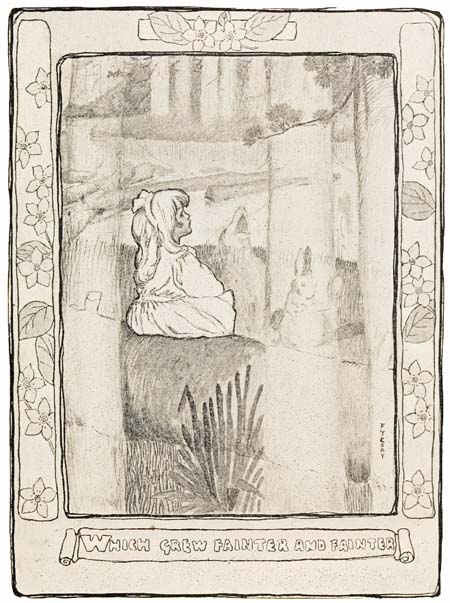
WHICH GREW FAINTER AND FAINTER
[26]Then, much to her surprise, she discovered that while she had been looking up and around, the Yellow Dog and the Laziest Beaver had vanished, and with them the tumble-down beaver house and the meadow and the little river. She was in the deep wood again, sitting on the fallen trunk of a great pine-tree, and watching a rabbit, who, apparently unconscious of her presence, was regarding himself in a small hand-glass, while he wabbled and wabbled and wabbled his nose.
How Buddie came to be whisked away from Beavertown to a part of the wood that, so far as she could tell, she had never seen before, remains to this day a mystery.
“It was the echo,” she said, in telling me the tale; “you just couldn’t help looking up.” Certainly it must have been a remarkable echo; and although it does not explain the matter entirely to my satisfaction, it is as convincing as any explanation I can offer. But, to go on with the story:
The Rabbit continued to regard himself in his mirror, wabbling his nose the while, until Buddie wondered whether he intended to keep it up all day. But at last he dropped the glass, which was suspended on a cord about his neck, and remarked, with a little sigh:
[28]“It’s no use. I can’t make it out.”
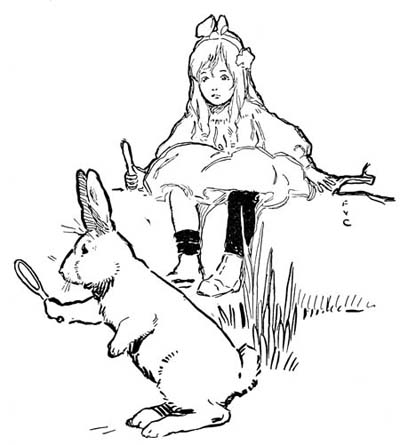
Buddie feared to move lest she send him scampering off; rabbits were such timid creatures—that is, all the rabbits she had ever come upon before. Still, she wished to talk with him[29] about his funny nose; so she coughed softly to attract his attention. This is an old trick and usually succeeds. The Rabbit turned his head, saw Buddie and exclaimed hurriedly, with a friendly smile:
“Don’t be alarmed, my dear!”
Buddie laughed outright.
“The idea of being afraid of a rabbit!” said she.
“Why not?” demanded the Rabbit, in a tone of offended dignity. “Size isn’t everything.”
“But rabbits are such scary little things,” Buddie started to say, when the Rabbit interrupted her.
“I’m not afraid of anybody,” he declared with a little swagger. He emphasized the last word so significantly, and it sounded so like “any Buddie,” that Buddie hastened to say:
“I didn’t know rabbits were so brave. I thought—”
“Never mind what you thought,” said the Rabbit, curtly. “It doesn’t help matters a bit.[30] Always speak twice before you think; then you won’t make mistakes. Nearly all mistakes are caused by hasty thinking. Didn’t you ever hear the expression, Bold as a rabbit?”
Buddie shook her head.
“I’ve heard about, Bold as a lion,” she replied.
The Rabbit sniffed.
“Lions? What are they?” he asked.
“I don’t believe there are any around here,” answered Buddie.
“I don’t believe there are, either,” said the Rabbit, with a self-satisfied smile. “But if there were I should teach them their place fast enough. The expression, Bold as a rabbit, is common enough—as common as, Wise as a goose, or, Silly as an owl, or, Fast as a snail, or, Sleepy as a weasel—and it’s a wonder you never heard it. Why, the word ‘hare-brained,’ or ‘rabbit-brained,’ means, bold to the point of recklessness.”
“Well,” thought Buddie, “if this isn’t the[31] queerest place anybody ever got into. Dogs sing, beavers are lazy, and rabbits are bold as lions. Everything seems to be upside down. What next, I wonder? I suppose,” she said aloud, “your name is Mr. Bunny Cotton-Tayle.”
The Rabbit bowed.
“And your name?” he asked politely.
“Buddie—just Buddie.” She was afraid he might ask, “Which Buddie?” as the Laziest Beaver had asked.
The Rabbit again consulted his mirror, and inquired carelessly, as one inquires who does not expect information:
“You don’t happen to know, I suppose?”
“Why you wabble your nose?”
“Precisely.”
“No,” confessed Buddie. “And I think it’s funny you can’t tell.”
“I don’t see anything funny in it,” said the Rabbit.
“I mean strange.”
[32]“Or strange. Why is a watermelon bald-headed, while a carrot has whiskers? Answer me that!”
“I don’t know,” Buddie again confessed.
“Did you ever ask a watermelon?”
“Of course not. That’s perfectly ’diculous. Who ever heard of a watermelon talking? But still,” Buddie added to herself, “if a rabbit can talk, why shouldn’t a watermelon?”
“Well, ask a watermelon sometime,” said the Rabbit; “or ask a carrot. Neither of them knows, any more than a dog knows when he’s hot.”
“I’m sure a dog knows when he’s hot,” objected Buddie.
“How do you know when you’re hot?” demanded the Rabbit, with a this-is-where-I-trip-you-up twinkle in his eye.
“Why, I get hot—I mean I get all sweaty and have to wipe my face and neck.”
“Exactly,” said the Rabbit. “You know when you’re hot because you sweat. But a dog[33] doesn’t sweat and can’t sweat. There! What do you say to that?”
“If my dog Colonel were here,” said Buddie, “I’m sure he could tell me.”
“Couldn’t,” declared the Rabbit. “Told me so himself, many a time. Haven’t you noticed that on the hottest day a dog will race round and run after sticks and stones and go on like mad until he simply drops from exhaustion? Now, if he could tell when he was hot, as you can, he would stop long before he gave out. That sort of thing is very wearing on a dog. That’s why he doesn’t live longer.”
As Buddie had no suitable reply ready the Rabbit continued:
“No, Buddie—I believe you said your name was Buddie?” Buddie nodded. “It’s so like my own—Bunny. No, Buddie, there are some things about ourselves we can’t explain, just as there are some things that are perfectly clear. For instance, I know why I can not run very far in a straight line, but have to zigzag.”
[34]“Do tell me!” cried Buddie, greatly interested.
“The reason is, my hindlegs are twice as long as my forelegs. After I run a little way my hindlegs overtake my forelegs, and if I were to keep on I should be going the other way, which would be extremely awkward, don’t you think?”
“I should think it would be,” murmured Buddie, to whom the explanation was by no means clear.
“Why, once when I started for home I was in such a hurry I forgot to zigzag, and before I realized it I was twice as far from home as when I set out. So when I am chasing a fox or a panther I have to make up in speed what I lose in ground. But as for this nose-wabbling,”—the Rabbit again consulted his pocket mirror and sighed deeply—“that gets me. I give it up. Even Doctor Goose, who knows everything—or almost everything—can’t explain that.”
[35]“The Laziest Beaver said you were going up to The Well to find the answer,” remarked Buddie, who was very curious to find out what sort of well it was.
“Yes; I am going up to The Well,” replied the Rabbit. “But I am not the only one that wishes to learn something. The Guinea-Pig wants to know why his eyes fall out when you hold him up by the tail.”
“But a guinea-pig hasn’t any tail,” said Buddie, who had owned one, and was quite sure it didn’t have a sign of a tail.
“I don’t know what sort of guinea-pigs you are in the habit of associating with,” said the Rabbit; “but all of my acquaintance have tails, and good long ones. Why shouldn’t a guinea-pig have a tail? A guinea-hen has.”
“I don’t know why it shouldn’t, but I know it hasn’t,” Buddie persisted.
“Well, here comes the Guinea-Pig now,” said the Rabbit; “and if that isn’t a tail he’s wearing, I don’t know a tail when I see it.”
[36]Buddie looked around and saw, almost at her feet, the dearest Guinea-Pig imaginable. She gave a cry of delight and stretched out her hand to caress it, just as she used to caress her own pet before it fell victim to a foraging fox.
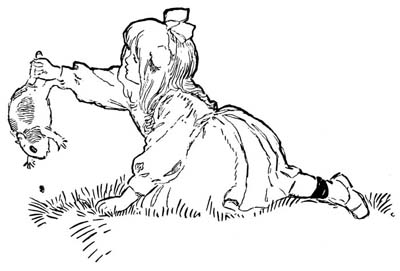
Now, Buddie did not mean to do it, but it came about in this way: startled by her exclamation, the Guinea-Pig turned and made off; Buddie reached forward eagerly, caught him, and lifted him up—by the tail!
Instantly his eyes fell out.
[37]“There! You’ve done it!” cried the Rabbit.
“I wish people wouldn’t pick me up by the tail,” sobbed the Guinea-Pig. He couldn’t weep, you see, because his eyes were out.
“Oh, you poor thing!” cried Buddie. And getting down on her hands and knees, she began hunting for the little creature’s eyes, which had rolled under the leaves.
“Really, I didn’t mean to pick you up by the tail,” said Buddie, turning over the leaves in search of the missing eyes.
“That’s what they all say,” sobbed the Guinea-Pig. “Can’t you find them? It never took so long before.”
“Here’s one! What a teeny little eye! And here’s the other! How do you put them back?” Buddie asked the Rabbit, who, mirror in hand, was again studying his nose.
“Ask the Guinea-Pig; they’re his eyes,” replied the Rabbit. “I have troubles of my own.”
Buddie took the Guinea-Pig in her lap.
“If I’m not doing it right you must tell me,” she said. “And do stop sobbing; it shakes your head so I can’t do a thing.”
[39]“I can’t stop,” blubbered the Guinea-Pig. “If I don’t cry I have to sob.”
“Well, cry a little, then, for a change. You won’t shake so.”
“But I can’t cry,” wailed the unhappy Guinea-Pig. “My eyes are out. Oh! oh!”
He gave a little squeak, more of fright than of pain, for Buddie had grasped him so tightly that he couldn’t shake, and scarcely could breathe.
“There!” she exclaimed triumphantly, slipping back the eyes. “Now you’re all right, and I’ll never pick you up by the tail again, you dear, dear little thing!”
She stroked him affectionately, but the Guinea-Pig, instead of cheering up, wept like a baby. His brown eyes fairly streamed tears.
“Oh! oh!” he cried. “Everything’s upside down!”
“I know it, dearie,” said Buddie, soothingly. She was getting used to the topsy-turviness of the wood, and she was not the least surprised to hear the Guinea-Pig wail forth:
[40]“You’re standing on your head! You’re standing on your head!”
“It only seems so to you,” Buddie replied. “You shouldn’t live in such a ’diculous wood, you know.”
“You’ve put his eyes in upside down, stupid!” said the Rabbit. “You ought to be more careful.”
“Dear! dear!” exclaimed Buddie, in dismay. “What’s to be done now?”
“Pick him up by the tail again,” was the brief advice.
“Oh! oh!” bawled the Guinea-Pig. “Must I go through all that again?”
“Don’t take on so,” soothed Buddie. “It’s for your own good. And we shan’t lose the eyes this time. We really shan’t.”
As gently as possible she lifted the Guinea-Pig by the tail, and when his eyes fell out she caught them in her hand.
“Be sure to put the right eye on the right side and the left eye on the left side,” said the Rabbit, “Otherwise he’ll be cross-eyed.”
[41]“I wonder which is which,” said the puzzled Buddie. “They ought to be marked.”
“You know the old rule for telling the left one. It’s the one you pick up second.”
“I don’t see why,” said Buddie, who had never heard the old rule.
“If you pick up one, the other is left, isn’t it?”
“But does it matter which one you pick up first?”
“Certainly not. How stupid you are!”
“Well, I’ll try this one,” said Buddie.
“That’s right,” said the Rabbit.
“There! I do hope I haven’t made any mistake,” said Buddie, when the operation was over. “Goodness! What are you crying about now? Do your eyes pain you?” For the Guinea-Pig continued to weep as if his little heart were broken.
“Oh, don’t mind him,” said the Rabbit. “He’s that way nearly all the time. Tell her the story of your life, old fellow,” he suggested, patting his weeping friend on the shoulder.
[42]“Yes, do!” encouraged Buddie. “It must be very sad,” she remarked to the Rabbit.
“Yes—when you’ve heard it for the first time,” he replied. “Come,”—to the Guinea-Pig,—“cheer up!”
“Perhaps if it’s so sad he may not want to tell us,” suggested Buddie, who was beginning to feel a bit tearful herself.
“Oh, he likes to talk about it,” said the Rabbit. “Everybody likes to talk about his own affairs. There’s my nose, for instance. Go on, old fellow. ‘I was born—’”
The Guinea-Pig dried his eyes with the back of his paw, sniffed once or twice and began:
“I was born in a large wire cage, in a doctor’s office, at the age of one.”
“How could you be?” Buddie interrupted. “You couldn’t be one year old when you were born, you know.”
“He means one second,” explained the Rabbit. “Don’t interrupt, or he’ll start bawling again.”
[43]“Next door to us lived another family of guinea-pigs,” went on Brown Eyes. “There were two daughters—one of them the sweetest, dearest—”
Here the Guinea-Pig broke down, and it was some time before he was able to resume his story.
“One day some visitors came to the office, and the doctor took me out and exhibited me to them. ‘Is he old enough to kill?’ asked one of the visitors. ‘Just the right age and weight, two hundred and fifty grams,’ replied the doctor. And before I could realize the meaning of these dreadful words he seized a glittering instrument and plunged it into my body.”
“Oh!” exclaimed Buddie, horrified. A warning glance from the Rabbit checked further comment.
“For twenty-four hours I lay senseless; and when I came to—alas! what was there to come to?—I was alone in the world! All, all were gone, the old familiar faces; and the doctor was looking into my cage and saying: ‘Well,[44] well! You’re a tough little Guinea-Pig, and no mistake.’”
A fresh flood of tears delayed the recital, and the Rabbit, who was anxious to be off, looked his impatience. With an effort the Guinea-Pig continued:
“I had tuberculosis in March, diphtheria in April, tetanus in May, and anthrax in June; but—but I recovered—”
“Of course you did,” said the Rabbit, cheerily; “otherwise you wouldn’t be here. Well, I’ve got to be moving along, as I have several important matters to attend to.”
“There! Don’t cry any more, Brown Eyes,” said Buddie, wiping the Guinea-Pig’s eyes with a corner of her dress.
“By the way,” said the Rabbit, “how would you like to look in on the Greenwood Club this afternoon? You can come as my guest, you know.”
“Ever so much!” replied Buddie, happily.
“Doctor Goose is to read a paper; and there[45] will be games and singing and the usual good time. We get together once a week, and even the Guinea-Pig forgets his troubles. Don’t you, old fellow?”
But Brown Eyes only snuffled.
“If you will meet me at the Corner at two o’clock,” said the Rabbit to Buddie, “I shall be happy to escort you to the Club. Good morning!” He bowed and hurried away.
“What corner?” Buddie called after him. “What corner? What Corner?”
But only an echo came back; and not, oddly enough, an echo of her own words, but something that sounded like
And, like everything else in this queer wood, the echo was upside down. That is to say, it began faintly and grew clearer, clearer, clearer, until the wood rang with it.
It seemed to come from somewhere overhead,[46] and Buddie looked up. As she did so, the interlacing tree-tops melted away, and the patches of sky ran together and became one big sheet of blue. Gradually she lowered her eyes, and—
There she was back in Beavertown, in the meadow bordering the little river. And there was the Laziest Beaver, lying in the sun and fanning himself with his tail. And there was the Yellow Dog, just finishing the chorus of his song, Nobody Knows.
Now wouldn’t that surprise you, Little One?
“Do you know, I think the twenty-third verse is the best of the lot,” said the Laziest Beaver. “Don’t you?”—appealing to Buddie.
“Why—I like them all,” she answered, much bewildered; and she pinched herself to make certain she was wide awake. “For,” she said to herself, “I must have fallen asleep and dreamed about the Rabbit and the Guinea-Pig. Have you sung twenty-three verses?” she asked the Yellow Dog.
“I’m just beginning the thirty-seventh,” he replied. “If you’re tired of the song I’ll stop.”
“Oh no; do go on!” cried Buddie. “But, you see, I lost count. Not that it matters a bit,” she added to herself; “one verse sounds just like another.”
[48]
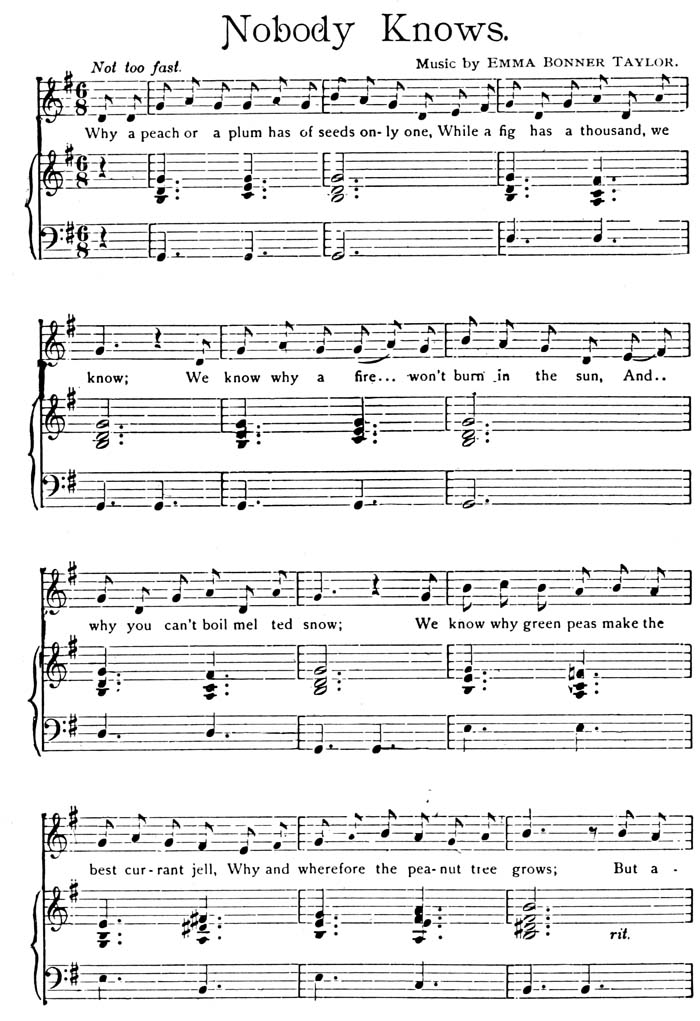
[49]
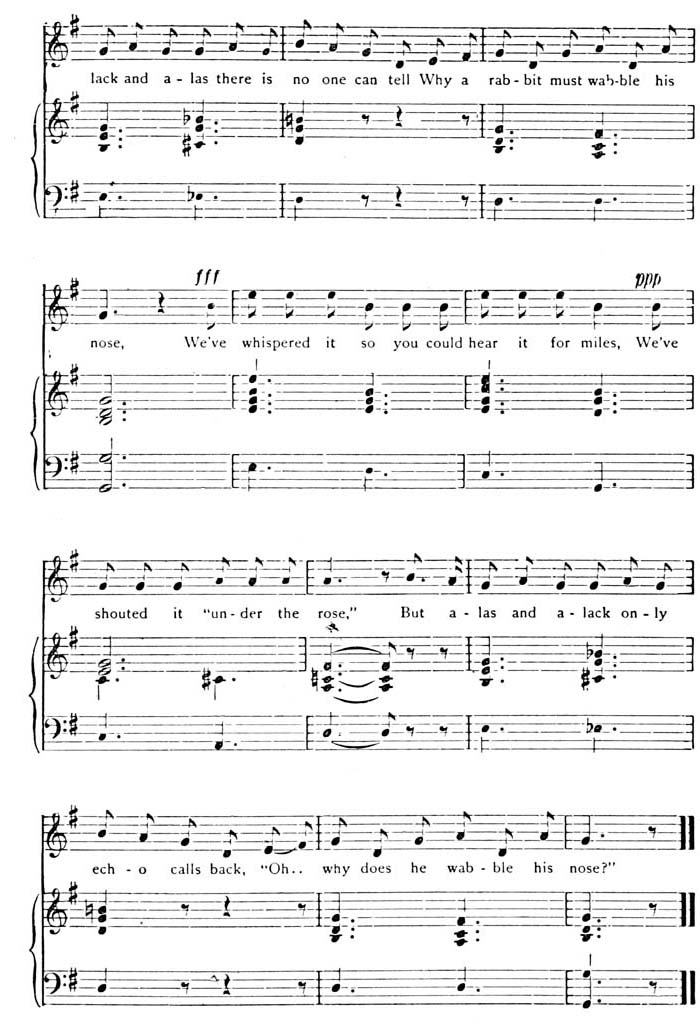
[ [MusicXML]
Nobody Knows.
Not too fast. Music by EMMA BONNER TAYLOR.
[50]The song was rather monotonous. You can get a very good idea of how the fiftieth verse sounded by singing the first verse twenty-five or thirty times.
“Bark away!” said the Laziest Beaver. “You’re wasting time.”
The Yellow Dog cleared his throat, which Buddie thought must be getting tired, and resumed:
Again that peculiar echo, the words of which seemed to play hide-and-seek right over Buddie’s head:
[51]
She looked up—to see the open sky break into little patches, as the tree-tops ran together; and when she looked down—lo! the Yellow Dog and the Laziest Beaver, the meadow and the little river had again vanished, and she was back in the deep wood where she had met the Rabbit and the Guinea-Pig.
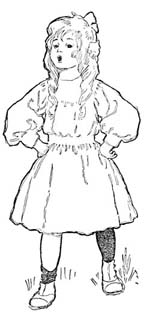
“So I didn’t dream it, after all,” she thought. “I’m glad of that; for perhaps I shall see them again. Only, I do wish these creatures wouldn’t go away so suddenly. It makes you feel funny all over. I wonder if Colonel is very far from[52] here. Perhaps he can hear me if I call.” And she began shouting at the top of her voice (and it was a long way to the top of it, I assure you):
“Colonel! Colonel! COLONEL!”
“Never halloo till you’re out of the wood,” piped a small voice.
Buddie looked about her and saw, perched on a balsam limb, a snow-white bird, who, with his head cocked on one side, was regarding her with the most comical expression imaginable.
“Never halloo till you are out of the wood,” he piped again.
“Why not?” asked Buddie.
“Because you’ll start the bark of the dogwood trees, and they’ll make noise enough to wake the dead leaves.”
This seemed a sufficient reason, and Buddie changed the subject.
“I never saw such a very white bird,” she said, gazing admiringly at her new acquaintance. The lake gulls were not nearly so snowy.
[53]“I’m not a whitebird; I’m a blackbird,” replied Snowfeathers.
“What’s the use of contradicting?” Buddie reflected. “Everything in this queer wood is wrong-end-to. Won’t you come down?” she invited, stretching out one hand. But the bird cocked his little head on t’other side and answered:
“A bird in the bush is worth two in the hand.”
“But I won’t hurt you, dearie,” coaxed Buddie, in such a sweet voice that Snowfeathers flew down from the balsam and perched on her shoulder.
“I’ve heard my papa say, You might as well try to catch a white blackbird,” said Buddie, stroking him; “but I’ve caught you, haven’t I?”
“And what did your papa mean by that, pray?” asked Snowfeathers.
“Why—I suppose—that there wasn’t any such thing. It’s perfectly ’diculous for a blackbird to be white.”
“Did you ever see any green or red blackberries?”
[54]
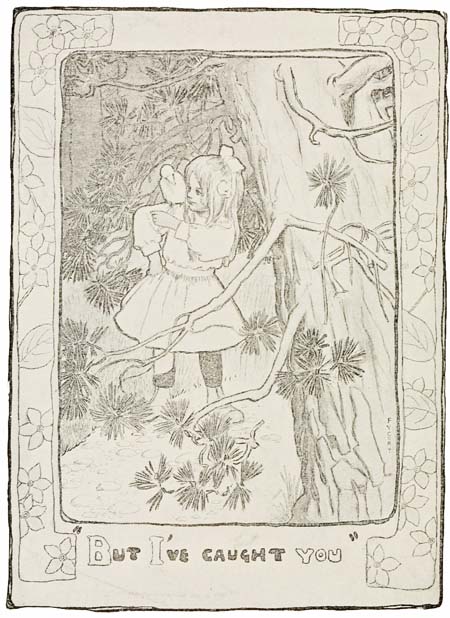
“BUT I’VE CAUGHT YOU”
[55]Buddie was somewhat taken aback by this question. “But they weren’t ripe, you know,” she said, after thinking a bit.
“Well, perhaps I’m not ripe,” said the White Blackbird; and that put an end to the argument.
“Oh!” cried Buddie, suddenly remembering her engagement with the Rabbit, “can you tell me where the Corner is?”
“Certainly,” replied the White Blackbird. “As the crow flies, it’s five trees straight ahead, ten to the right, fifteen straight ahead, twenty to the right, twenty-five straight ahead, thirty to the right, and then straight ahead to the Corner. You can’t miss it.”
“Dear me! I never could remember that!” said Buddie.
“It’s as easy as rolling off a prairie,” said Snowfeathers. “Just keep to the right, and count five—ten—fifteen—twenty—twenty-five—thirty. All you really have to keep in mind is the dead trees; they don’t count.”
[56]“My papa says crows fly in a straight line, like bees,” ventured Buddie.
“It would take you a week to go by a B line,” replied Snowfeathers. “Evidently you don’t know what a B line is. Here’s one.”
Snowfeathers flew into the air, and described a number of graceful curves.
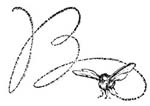
“Catch the idea?” he asked.
“Not exactly,” said Buddie.
“You are not very observant,” said the bird. “Don’t you know a B line when you see it?”
“I didn’t see any bee,” replied the puzzled Buddie.
“Then you don’t know a B when you see it,” said Snowfeathers.
“But my papa says a bee-line is straight,” persisted Buddie, not so sure that her father wasn’t right and Snowfeathers wrong.
“Your papa seems to know a great many[57] things that aren’t so,” was the White Blackbird’s reply. “I dare say he tells you that the early bird catches the worm.”

Buddie nodded.
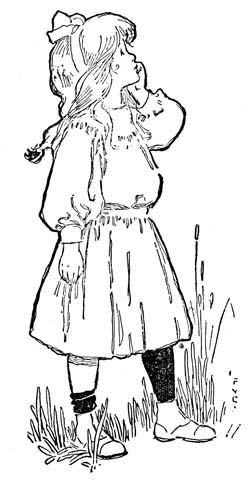
“Which goes to prove that if you repeat a thing enough times you come to believe it. Now, the early bird does nothing of the sort. Mind, I don’t say he couldn’t catch the worm; worms are such stupid creatures that any bird can catch them, at any time of day. But they are much too hearty for breakfast. One shouldn’t eat meat more than once a day; and as for feeding it to fledglings, that is not to be thought of.”
[58]“Then, what do you eat for breakfast?” asked Buddie.
“Usually cracked wheat or rolled oats or some other kind of bird-seed—when I can get it. Then, I’m very fond of cherries and other small fruits. That’s why most birds make their homes in a farming country, where there is plenty of the right sort of breakfast food. I live some way south of here, in a wheat country, where I can have cracked wheat every morning; but once a year I take a trip into the pine woods for the benefit of my lungs. It’s no place for a small bird to live, though it does very well for a health trip. But you said you were going up to the Corner. If you wish, I’ll show you the way.”
“Thank you ever so much,” said Buddie. “I’ll count the trees, and you must tell me when I make mistakes. And now,”—jumping up—“which way do we go first?”
“Straight ahead,” said Snowfeathers, again perching on her shoulder. And the two set out for the Corner.
[59]The first turn was reached without mistake, as there were only five trees to count, and there was no doubt that all of them were alive.
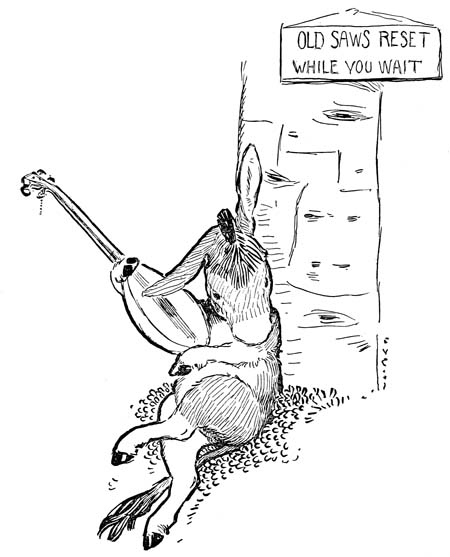
“Now, ten to the right,” said the White Blackbird.
But Buddie got no farther. The sound of music came to her ears, and she stopped to[60] listen. The music was faint and sweet, with the sighful quality of an Æolian harp. Now it seemed near, now far.
“What can it be?” said Buddie.
“Wait here and I’ll find out,” said Snowfeathers. He darted away and returned before you could count fifty.
“A traveling musician,” he reported. “Come along. It’s only a little way.”
Back he flew, with Buddie scrambling after. A few yards brought her to a little open place, and here was the queerest sight she had yet seen in this queer wood.
On a bank of reindeer moss, at the foot of a great white birch, a mouse-colored donkey sat playing a lute. Over his head, hanging from a bit of bark, was the sign:
OLD SAWS RESET
WHILE YOU WAIT
After the many strange things that Buddie had come upon in Queerwood, nothing could surprise her very much. Besides, as she never before had seen a donkey, or a lute, or the combination of donkey and lute, it did not strike her as especially remarkable that the musician should be holding his instrument upside down, and sweeping the strings with one of his long ears, which he was able to wave without moving his head a jot. And this it was that gave to the music its soft and furry-purry quality.
The Donkey greeted Buddie with a careless nod, and remarked, as if anticipating a comment he had heard many times:
“Oh, yes; I play everything by ear.”
“Please keep on playing,” said Buddie, taking a seat on another clump of reindeer moss.
[62]“I intended to,” said the Donkey; and the random chords changed to a crooning melody which wonderfully pleased Buddie, whose opportunities to hear music were sadly few. As for the White Blackbird, he tucked his little head under his wing and went fast asleep.
“Well, what do you think of it?” asked the Donkey, putting down the lute.
“Very nice, sir,” answered Buddie, enthusiastically; though she added to herself: “The idea of saying ‘sir’ to an animal! Would you please tell me your name?” she requested.
The Donkey pawed open a saddle-bag, drew forth with his teeth a card, and presented it to Buddie, who spelled out the following:
PROFESSOR BRAY
TENORE BARITONALE
TEACHER OF SINGING ALL METHODS
CONCERTS AND RECITALS
While Buddie was reading this the Donkey[63] again picked up his instrument and thrummed the strings.
“Did you ever see a donkey play a lute?” said he. “That’s an old saw,” he added.
“I never saw a donkey before,” said Buddie.
“You haven’t traveled much,” said the other. “The world is full of them.”
“This is the farthest I’ve ever been from home,” confessed Buddie, feeling very insignificant indeed.
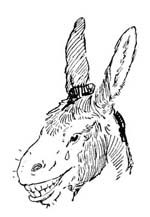
“And how far may that be?”
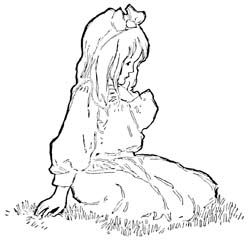
Buddie couldn’t tell exactly.
“But it can’t be a great way,” she said. “I live in the log house by the lake.”
“Pooh!” said the Donkey. “That’s no distance at all.” Buddie shrank another inch or two. “I’m a great traveler myself. All donkeys travel that can. If a donkey travels, you know, he may come home a horse; and to become a horse is, of course, the ambition of every donkey!”
“Is it?” was all Buddie could think of to remark.[64] What could she say that would interest a globe-trotter?
“Perhaps you have an old saw you’d like reset,” suggested the Donkey, still thrumming the lute-strings.
Buddie thought a moment.
“There’s an old saw hanging up in our woodshed,” she began, but got no further.
“Hee-haw! hee-haw!” laughed the Donkey. “Thistles and cactus, but that’s rich!” And he hee-hawed until the tears ran down his nose. Poor Buddie, who knew she was being laughed at but didn’t know why,[65] began to feel very much like crying and wished she might run away.
“Excuse these tears,” the Donkey said at last, recovering his family gravity. “Didn’t you ever hear the saying, A burnt child dreads the fire?”
Buddie nodded, and plucked up her spirits.
“Well, that’s an old saw. And you must have heard that other very old saw, No use crying over spilled milk.”
Another nod from Buddie.
“Here’s my setting of that,” said the Donkey; and after a few introductory chords, he sang:
[66]
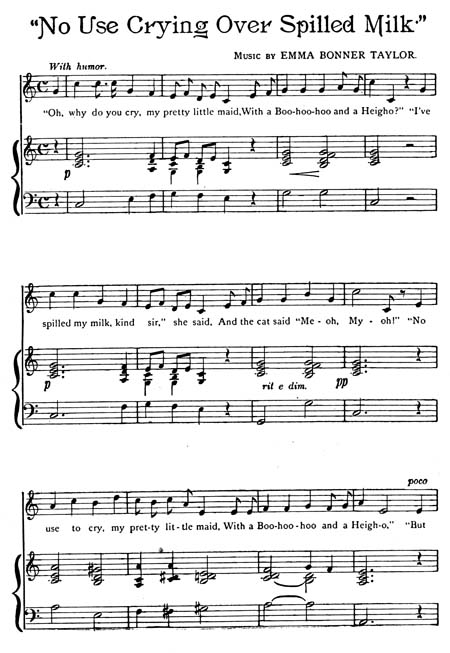
[67]
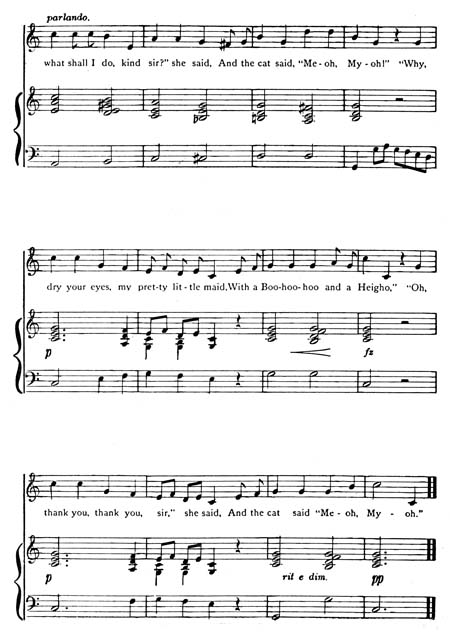
[ [MusicXML]
No Use Crying Over Spilled Milk
With humor. MUSIC BY EMMA BONNER TAYLOR
[68]If you would like to know what sort of composer the Donkey was, you may play the song printed on the page opposite to this.
“How do you like my voice?” asked the Donkey, in a tone that said very plainly: “If you don’t like it you’re no judge of singing.”
Buddie did not at once reply. A professional critic would have said, and enjoyed saying, that the voice was of the hit-or-miss variety; that it was pitched too high (all donkeys make that mistake); that it was harsh, rasping and unsympathetic, and that altogether the performance was “not convincing.”
Now, Little One, although Buddie was not a professional critic, and neither knew how to wound nor enjoyed wounding, even she found the Donkey’s voice harsh; but she did not wish to hurt his feelings—for donkeys have feelings, in spite of a popular opinion to the contrary. And, after all, it was pretty good singing for a donkey. Critics should not, as they sometimes do, apply to donkeys the standards by which nightingales are judged. So Buddie was able to say, truthfully and kindly:
“I think you do very well; very well, indeed.”
[69]It was a small tribute, but the Donkey was so blinded by conceit that he accepted it as the greatest compliment.
“I ought to sing well,” he said. “I’ve studied methods enough. The more methods you try, you know, the more of a donkey you are.”
“Oh, yes,” murmured Buddie, not understanding in the least.
“Yes,” went on the Donkey; “I’ve taken the Donkesi Method, the Sobraylia Method, the Thistlefixu Method—”
“I’m afraid I don’t quite know what you mean by ‘methods,’” ventured Buddie.
The Donkey regarded her with a pitying smile.
“A method,” he explained, “is a way of singing ‘Ah!’ For example, in the Thistlefixu[70] Method, which I am at present using, I fill my mouth full of thistles, stand on one leg, take in a breath three yards long, and sing ‘Ah!’ The only trouble with this method is that the thistles tickle your throat and make you cough, and you have to spray the vocal cords twice a day, which is considerable trouble, especially when traveling, as I always am.”
“I should think it would be,” said Buddie. “Won’t you sing something else?”
“I’m a little hoarse,” apologized the singer.
“That’s what you want to be, isn’t it?” said Buddie, misunderstanding him.
“Hee-haw!” laughed the Donkey. “Is that a joke? I mean my throat is hoarse.”
“And the rest of you is donkey!” cried Buddie, who could see a point as quickly as any one of her age.
“There’s something to that,” said the other, thoughtfully. “Now, if the hoarseness should spread—”
“And you became horse all over—”
[71]“Why, then—”
“Why, then—”
“Think of another old saw,” said the Donkey, picking up his lute.
“No; I don’t believe I can remember any more old saws,” said Buddie, after racking her small brain for a minute or two.
“Pooh!” said the Donkey. “They’re as common as, Pass the butter, or, Some more tea, please. Ever hear, Fair words butter no parsnips?”
Buddie shook her head.
“The wolf does something every day that keeps him from church on Sunday—?”
Again Buddie shook her head.
“It is hard to shave an egg—?”
Still another shake.
“A miss is as good as a mile? You can not drive a windmill with a pair of bellows? Help the lame dog over the stile? A hand-saw is a[73] good thing, but not to shave with? Nothing venture, nothing have? Well, you haven’t heard much, for a fact,” said the Donkey, contemptuously, as Buddie shook her head after each proverb. “I’ll try a few more; there’s no end to them. Ever hear, When the sky falls we shall all catch larks? Too many cooks spoil the broth?”
“I’ve heard that,” said Buddie, eagerly.
“It’s a wonder,” returned the Donkey. “Well, I have a very nice setting of that.” And he sang:
“I like that,” said Buddie. “Oh, and I’ve[74] just thought of another old ax—I mean saw, if it is one—Don’t count your chickens before they are hatched. Do you sing that?”
“One of my best,” replied the Donkey. And again he sang:
“I like that the best,” said Buddie, who knew what it was to tip over a pail of eggs, and felt as sorry for Sammy Patch as if he really existed.
“It’s one of my best,” said the Donkey. “I don’t call it my very best. Personally I prefer, Look before you leap. You’ve heard that old saw, I dare say.”
[75]“No; but that doesn’t matter. I shall like it just as well,” replied Buddie.
“That doesn’t follow, but this does,” said the Donkey, and once more he sang:
Buddie, however, clung to her former opinion. “I like Sammy Patch the best,” said she.
[76]“That,” rejoined the singer, “is a matter of taste, as the donkey said to the horse who preferred hay to thistles. Usually the public likes best the very piece the composer himself cares least about. So wherever I go I hear, ‘Oh, Professor, do sing us that beautiful song about Sammy Patch.’ And I can’t poke my head inside the Thistle Club but some donkey bawls out, ‘Here’s Bray! Now we’ll have a song. Sing us Sammy Patch, old fellow.’ Really, I’ve sung that song so many times I’m tired of the sound of it.”
“It must be nice to be such a favorite,” said Buddie.
“Suppose we go up to the Corner and see what’s stirring,” suggested the Donkey, with a yawn.
“Oh, are you going up to the Corner, too?” cried Buddie. “I am to meet the Rabbit there at two o’clock. I hope it isn’t late.”
The Donkey glanced skyward.
“It isn’t noon yet,” said he.
[77]
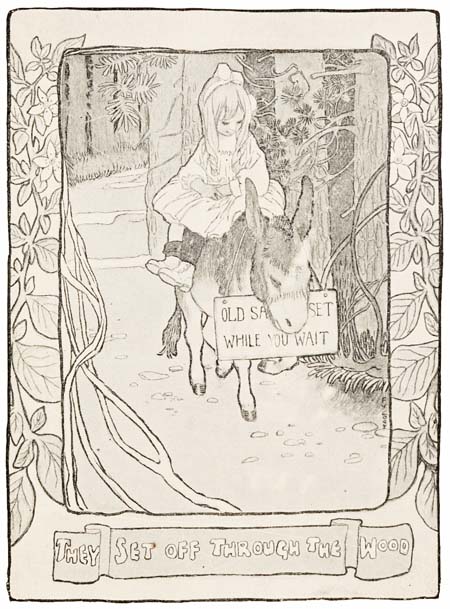
THEY SET OFF THROUGH THE WOOD
[78]“How do you tell time?” inquired Buddie.
“By the way it flies. Time flies, you know. You can tell a great many birds that way, too.” As he spoke the Donkey put his lute into one of his bags and took down his sign.
“You can ride if you wish,” he offered graciously.
“Thank you,” said Buddie. And leaving the White Blackbird asleep on his perch,—for, as Buddie said, he was having such a lovely nap it would be a pity to wake him,—they set off through the wood.
It was bad traveling for a short distance, but presently they came out on an old log-road; and along this the Donkey ambled at an easy pace. On both sides grew wild flowers in wonderful abundance, but, as Buddie noticed, they were all of one kind—Enchanter’s Nightshade.
Buddie had also noticed, when she climbed to her comfortable seat, a peculiar marking on the Donkey’s broad back. It was bronze in color, and in shape like a cross.
[79]“Perhaps it’s a strawberry mark,” she thought, “and he may not want to talk about it.” But curiosity got the better of her.
“Oh, that?” said the Donkey, carelessly, in reply to a question. “That’s a Victoria Cross. I served three months with the British army in South Africa, and was decorated for gallantry in leading a charge of the ambulance corps. I shall have to ask you not to hang things on my neck. It’s all I can do to hold up my head.”
“Oh, excuse me,” said Buddie, untying the sign, Old Saws Reset While You Wait.
“Hang it round your own neck,” said the Donkey, and Buddie did so.
“I often wonder,” she said, “whether a horse doesn’t sometimes get tired holding his head out at the end of his neck. And as for a giraffe, I don’t see how he stands it.”
“Well, a giraffe’s neck runs out at a more convenient angle,” said the Donkey. “Still, it is tiresome without a check-rein. You hear[80] a great deal about a check-rein being a cruel invention, but, on the contrary, it’s a great blessing. Now, a nose-bag is a positive outrage, and the more oats it contains the more of an imposition it is. People have the queerest ideas!”
At this moment Buddie’s sharp eyes discovered a large animal ahead of them, at a bend of the road.
“Goodness! It’s a bear!” she exclaimed when they drew nearer.
“Well, what of it?” said the Donkey.
“I’m afraid of bears,” confided Buddie.
“Pooh!” said the Donkey. “They’re the mildest creatures in the world.”
In spite of this assurance Buddie was glad she was not alone, else she certainly would have taken to her heels.
The Bear was sitting on a wayside stump and looking up the road. That is, he would have been looking up the road if his eyes had been open instead of shut.
“He’s asleep,” whispered Buddie. “Don’t wake him.” For she could not quite bring herself to believe the Donkey’s statement that bears are the mildest creatures in the world, even if you don’t eat their porridge, and break their chairs, and rumple their beds, as the naughty old woman in the revised edition of the old story did.
The Bear raised his head slowly and turned on the new-comers a pair of tired-looking eyes.
“I can’t sleep,” said he.
“Pooh!” said the Donkey. “You’re half-asleep now.”
[82]“That’s just it,” returned the Bear, with a sigh. “I can’t get more than half-asleep.”
He really did appear gentle, and Buddie ventured to address him.
“If you sleep all winter—,” she began.
“Who said I slept all winter?” demanded the Bear, indignantly.
“I thought all bears did,” replied Buddie, confused.
“And ever since the first of May, when I moved,” went on the Bear, “I haven’t slept at all.”
“You wouldn’t earn much in the Land of Nod, where they pay you for sleeping,” said the Donkey. “That’s another old saw,” he added in an aside to Buddie.
“Do you sing that, too?” she asked.
“Yes; but you’ll have to get down,” the Donkey replied. “It’s very hard to sing with some one on your back,—though I have studied that method.”
Buddie slid down and handed the lute to the Donkey, who immediately began:
[83]
“Very true,” said the Bear, disconsolately, when the song was done. “But what’s the use of going to bed if you can’t sleep? You don’t know what it is”—appealing to Buddie—“to lie awake all night and listen to the servants snoring and you unable to get a wink.”
[84]Buddie certainly had no personal knowledge of such an unpleasant state of affairs. She slept “like a top” from dark to daybreak, and did not even hear Colonel, weary from the day’s play, snoring under the kitchen stove. Still, she thought she ought to make some reply to the Bear’s appeal for sympathy; so she said:
“Do you keep servants?”
“Six,” answered the Bear; “and a worthless lot they are.”
“You’ve got something on your mind; that’s why you can’t sleep,” said the Donkey, with an air that implied, “You needn’t try to deceive me.”
“Very true,” said the Bear.
“Then the best thing for you to do is to confess,” said the Donkey, decisively. “A clear conscience is the best sleeping powder. Come, out with it! You’ve been stealing sheep.”
“Oh, it isn’t anything of that sort,” said the Bear, hastily. “I’ve been this way ever since I moved, last May.”
[85]“Sometimes when I’ve eaten a late supper I don’t go to sleep right away,” said the Donkey. “In such cases I begin counting two hundred sheep going through the bars, one by one, and by the time I get to a hundred and twenty-three—why, I’m snoring.”
“I’ve tried that,” said the Bear. “It doesn’t work.”
“Well, try counting the nuts on a tree, or the blueberries on a bush.”
“I have—over and over.”
“Perhaps you don’t count slowly enough. That makes a difference.”
“Not with me,” said the Bear, half-closing his eyes. “I’ve imagined a crow flying round—and round—and round,”—his voice grew drowsy;—“I’ve imagined a squirrel going round—and round—and round a tree,”—his voice grew drowsier and drowsier;—“I’ve counted both ways from a hundred; I’ve counted up to twenty-three hundred—multiplied by eighty-four—subtracted nine hundred[86] and ninety-nine—divided by seven—added six hundred and thirty—put down eight and car-r-i-e-d three-e-e-e—”
The Bear’s voice died away in a whisper, and his head drooped.
“What was the answer?” the Donkey shouted in his ear.
“You needn’t holler so,” said the Bear, with a start. “I wasn’t asleep.”
“You were half-asleep,” said the Donkey.
“Ever since I moved,” repeated the Bear.
Now, Buddie did not pretend to be as wise as the Donkey, but she had wit enough to perceive that there was some connection between the Bear’s May moving and his lying awake o’nights. So she inquired:
“Don’t you like the new place you moved to?”
“Oh, yes; quite well, indeed,” was the reply. “The neighborhood is the very best; the rooms are large and well lighted, with fine hardrock floors; the roof doesn’t leak, and altogether[87] it’s the best place I ever lived in. But the trouble is, I can’t decide how to furnish my den. Here it is August, and I haven’t done a thing to it. It’s on my mind night and day. One person advises this, another that, another something else. Would you say black curtains or pink?” the Bear asked Buddie.
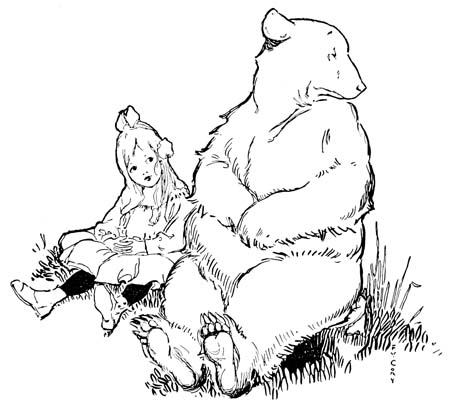
[88]“Oh, pink,” she replied, as that was her favorite color.
“That’s what Doctor Goose advises; but Doctor Fox thinks black would be better, as it would harmonize with my fur.”
“It seems to me,” said the Donkey, “that such matters might be left to Mrs. Bear.”
“There isn’t any,” returned the Bear, with a sigh. “I’m a bachelor.”
“What’s that?” asked Buddie.
“A bachelor,” replied the Donkey, “is a person who lives in a den and doesn’t have to worry about anybody except himself.”
“Are you a bachelor, too?” Buddie asked.
“No,” sighed the Donkey.
“That’s funny,” Buddie thought. “One is sorry because he is, and the other because he isn’t. Then there isn’t any Middle Bear and Little Small Wee Bear?” she said aloud, a little disappointed.
“Evidently not,” said the Donkey.
“Only the Great Hooge Bear?”
[89]
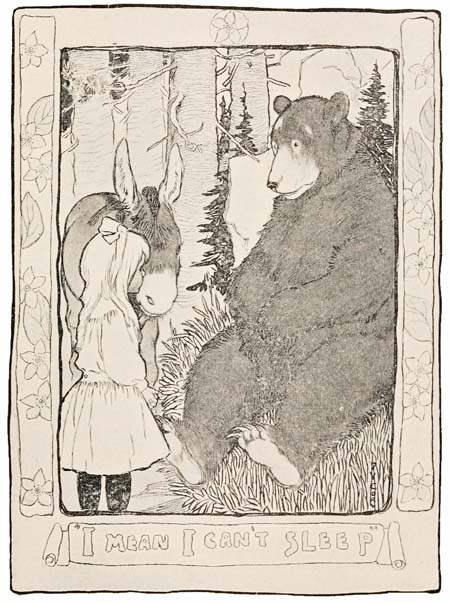
“I MEAN I CAN’T SLEEP”
[90]“I’m not so fat as I was before I got insomania,” said the Bear.
At this strange word Buddie wrinkled her small brows.
“You mean insomnia,” corrected the Donkey.
“I mean I can’t sleep; that’s what I mean,” said the Bear. “Will you take dinner with me?” he asked, looking from Buddie to the Donkey. “It would be a great honor.”
“Well, if you put it that way, of course we will,” said the Donkey, speaking for both of them. “Will there be thistles?”
“I can send out for them.”
“Scotch thistles, please; they’re the best. And I hope it isn’t far.”
“Only a little way,” said the Bear. And, rising from the stump, he led the way up the road.
“Pray, what do you have for servants?” asked the Donkey, as they crossed a brook and struck up a little hill.
“Coons,” the Bear replied. “They make the best.”
“If they weren’t so lazy and shiftless,” said the Donkey.
“They are lazy,” the Bear admitted. “I have to keep poking them up all the time; but it doesn’t do much good.”
“I shouldn’t think you would need six servants,” Buddie spoke up. What could a bear without a family want with so many?
“Well, I hired only one,” said the Bear, “and he got five others to do the work. He won’t do a thing himself; though he does condescend[92] to wait on table when there’s company.”
“He must get pretty high wages to be able to hire five assistants,” remarked the Donkey.
“Oh, he doesn’t pay them anything. He just boards and sleeps them—at my expense.” The Bear sighed in a resigned sort of way. Evidently the case was hopeless.
“I wouldn’t stand it!” Buddie declared. It was a shame to impose on such good nature.
“I have to grin and bear it,” was the reply. “That’s the motto of our family: Grin and Bear It.”
“And a very good motto it is,” said the Donkey. “Now, you never see a bear without a grin.”
“So Doctor Goose says,” said the Bear. “He claims the bear came first and the grin afterward. But Doctor Fox claims the grin came first. Otherwise, he says, the motto would be, Bear and Grin It.”
“What difference does it make?” said Buddie.
“Not a mite, that I can see,” said the Bear.[93] “I have to grin, and I have to bear it. But to hear Doctor Fox and Doctor Goose go on, you would think it was the most important matter in the world. Here we are.”
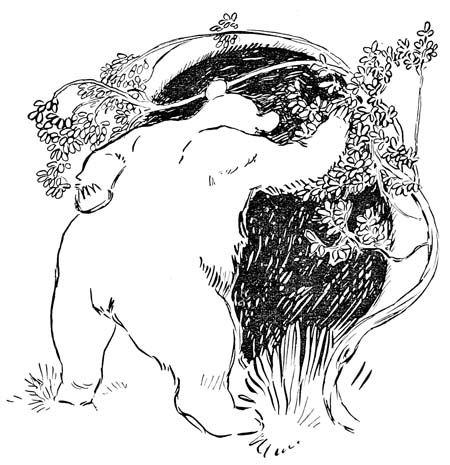
The Bear drew aside a bush that screened the entrance to a cave, and called out:
[94]“Sam! O Sam! Where are you, Sam?”
A sound of shuffling feet came from the interior, and presently the Oldest Coon made his appearance, rubbing his eyes as if he had just wakened from a nap. But at sight of the Donkey and Buddie he straightened up and put on an air of great dignity.
“Step this way, please,” he said with a grand bow, and led the way inside.
First was a long and dimly-lighted corridor, which ended, the Bear said, in a reception-room. From this came a clatter of small talk, and Buddie was curious to learn who the talkers were; but before they reached the reception-room, the Oldest Coon bowed them into a smaller apartment that opened off the corridor. This, the Bear informed them, was his den.
“You can hang up your hat and wraps here,” he said to Buddie.
“But I haven’t any hat and wraps,” said she; “and it’s just as well, as I don’t see any place to hang them.” For there wasn’t a[95] stick of furniture in the room or a hook on the wall.
“It’s certainly a bear place,” said the Donkey, hee-hawing at his own joke.
“I mean to have a hall-tree,” the Bear apologized; “but I can’t decide on the kind to get. Doctor Goose advises birch, but Doctor Fox claims poplar is the best. All the newest things, he says, are poplar.”
“What’s a hall-tree?” inquired Buddie. There was no such thing in her home.
“A hall-tree,” the Donkey explained, “is a tree that grows in the hall, just as a shade-tree is a tree that grows in the shade. The trouble with birch and poplar”—turning to the Bear—“is that they grow so fast you have to keep lopping them off, unless your hall is very high, and this one isn’t.”
“I must see about those thistles,” said the Bear, and hurried away. But he was back in a moment. “I forgot to tell you we dress for dinner,” he said, and was off again.
[96]“I always carry a dinner-coat with me,” said the Donkey, and from one of his saddle-bags he drew out a remarkable jacket in red and green checks, embroidered all over with Scotch thistles.
“I forgot to say,” said the Bear, again poking his head inside the den, “it’s to be a birthday dinner.”
“Whose?” cried Buddie. But the Bear was out of hearing. “Let me help you,” she said to the Donkey, who was making such awkward work of getting into his dinner-coat that she scarcely could keep from laughing.
“Thank you,” he replied. “It is a little hard to manage. How do I look? There isn’t a glass in the room.”
“Very fine indeed,” Buddie assured him. And then it suddenly occurred to her that she had no dinner-coat, and she wondered what she should do.
“Pooh!” said the Donkey. “You’re dressed already. Shall we go in?”
[97]The Oldest Coon was waiting at the entrance to the reception-room to announce them.
“Professor Bray!” he called out pompously, as the Donkey passed in. “Your name, please?”—turning to Buddie.
“Just Buddie,” she replied in a whisper.
“Just Buddie!” announced the Oldest Coon. And Buddie found herself in a large high room, almost round, in which was assembled as queer a company, Little One, as ever you saw in a picture-book, or out. The one familiar face was that of the Rabbit. He wore a white cut-away coat and a large pink cravat, and he was talking to a Little Small Wee Bear, who was dressed in a blue reefer, with a sash of the same color. And Buddie guessed it was the Wee Bear’s birthday party, as all the other guests were grouped about her and paying her many small attentions.
The other guests were a Middle Bear (who, as Buddie afterward learned, was the mother of the Wee Bear and the sister of the Great[98] Huge Bear), a Porcupine, an Owl and a Loon. The Middle Bear wore a long linen duster, which didn’t fit her any too well, and the Owl a snug-fitting jersey of what looked suspiciously like mouse-skin; the Loon wore a tightly-fitting mackintosh, and the Porcupine had decided on an Eton jacket as an appropriate dress for dinner.
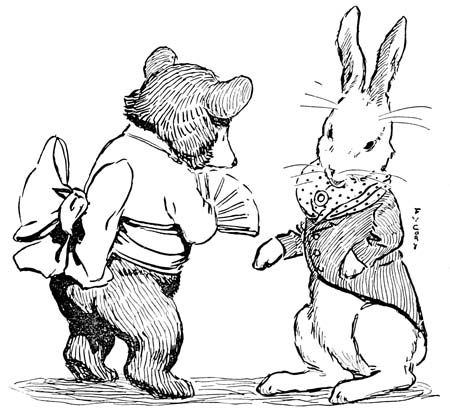
[99]“I wonder how he ever got that on over his quills,” Buddie said to herself. She had seen porcupines before. They came lumbering round the log house in the most sociable way, and chewed up ax-handles, barn-doors and other woody delicacies. And Buddie recalled one exciting day when Colonel came home with his nose and mouth filled with quills. How he did howl when her father pulled them out with a pair of pincers!
Buddie wished she might slip into a corner and watch the others; but the Rabbit came hurrying over to introduce her to the company, and presently Buddie found herself telling the Wee Bear she was ever so glad to meet her, and the Wee Bear was telling her, in return, that she was just one year old and was having such a nice birthday party.
“Do you go to kindergarten?” asked the Wee Bear.
Now, would you believe it, Little One? Buddie had never even heard the word before, and[100] the Middle Bear had to explain that a kindergarten was a place where children were taught, without their knowing it, the most remarkable things. Wee Bears were taught to eat honey; rabbits, to hold up their ears when listening intently; squirrels, to crack nuts, and so on. The fishes took the water course, and learned from a wise old Trout how to breathe under water and how to move their fins. For the feathered tribe there was a venerable Bat, who gave instruction in twigonometry and all the other branches of treeology.
“There were no kindergartens when I was young,” concluded the Middle Bear, “and I have often wondered how I managed to learn the way to eat honey.”
“This week,” chimed in the Wee Bear, “I am learning to pick blueberries.”
“The best of it is,” said the Middle Bear, “these nature studies take the little ones out of doors, where there is plenty of fresh air and sky.”
[101]Just then Buddie discovered that the Porcupine, who was sitting beside the Wee Bear, had quills as soft and silky as the fur on a kitten’s back.
“He’s a Fretless Porcupine,” said the Middle Bear, when she whispered that she had never seen quills of that sort before. “He never frets, no matter what happens.”
Buddie did not see what fretting had to do with quills; and before she had a chance to inquire, the Donkey came along to pay his respects to the Wee Bear and her mother.
As Buddie was not used to “going out in company,” she hardly knew what to say, other than “Yes” or “No,” when some one of the guests addressed a question to her, which wasn’t often. Fortunately they paid very little attention to her, so she was able to sit and listen to the chatter around her.
Not so the Donkey. He moved about with the ease of one accustomed to polite society, dropping a compliment here and a joke there,[102] wishing the Wee Bear many happy returns of the day, and congratulating the Rabbit on the fit of his coat.
“I hope they’ll have dinner soon,” Buddie thought. “I’m dreadfully hungry.”
She could hear a bustle in the room she took to be the kitchen; and presently she caught sight of one of the Coons struggling into it with a big basket of Scotch thistles.
“There goes your dinner,” she whispered to the Donkey. “Now, perhaps, they’ll ring the bell.”
“They’re waiting for Doctor Fox and Doctor Goose,” said the Donkey.
At that moment loud voices were heard in the hall. As they came nearer Buddie caught such phrases as “I deny it,” “Nothing of the sort,” “The grin came first,” “Stuff and nonsense!”—all jumbled up together; and the two Doctors came into the room.
A queer-looking pair they were: both wore long black coats and tall hats, and on the nose[103] of each (provided, of course, that a goose has a nose) was a pair of spectacles. Doctor Goose was waving his wings and Doctor Fox his paws, and both were talking at the tops of their voices.
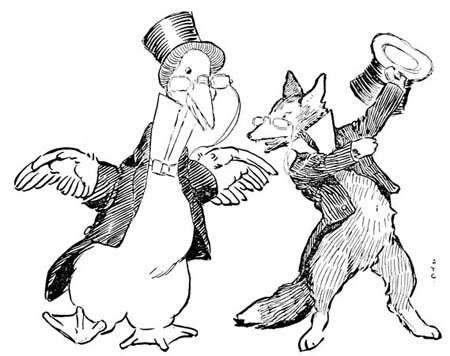
“They’re at it again,” said the Great Huge Bear, who had followed them in.
“I say the bear came first,” shouted Doctor Goose.
[104]“Nothing of the sort,” shouted Doctor Fox. “The grin—”
The controversy was happily interrupted by the Oldest Coon, who thrust his head inside the room and bawled out:
“Dinner!”
Such a queer company called for a queer table. This was long and narrow, and the dishes were placed all on one side. Steps led up to the other side for the waiters to ascend, for not one of the Coons was tall enough, even when he stood on tiptoes, to reach the top of the table from the floor.
The three Bears sat in the middle, with Buddie on the right and the Donkey on the left; and, in order to “keep peace in the family,” as the saying goes, Doctor Fox had been seated at one end of the table and Doctor Goose at the other. But, as we shall see, this arrangement did not long keep them from quarreling.
It was strictly a vegetarian dinner, and no two guests, except the Bears, had the same[106] thing to eat. The Bears, of course, had porridge. There was a big bowl of it for the Great Huge Bear, a middle-sized bowl for the Middle Bear, and a wee bowl for the Little Small Wee Bear.
“And I suppose,” thought Buddie, “the Great Hooge Bear’s porridge would be too hot for me, and the Middle Bear’s too cold, and the Little Small Wee Bear’s just right. Goodness! Aren’t they going to give me anything to eat?” She had suddenly discovered that her plate was empty.
“I didn’t know what you liked,” said the Great Huge Bear, “so I thought I’d let you order.”
Buddie was much embarrassed. For one thing, everybody stopped talking and watched her curiously; and for another, she hadn’t the least idea what to ask for, except porridge, and she didn’t like that very well.
“Order anything you like,” said the Great Huge Bear.
[107]“Some porridge, please,” Buddie at last decided. Porridge would be better than nothing.
“Sam!” called the Great Huge Bear.
“Yessir!” replied the Oldest Coon, running up on the table.
“A bowl of porridge for Just Buddie.”
“There ain’t no more porridge,” said the Oldest Coon.
“Anything else?” inquired the Great Huge Bear, anxiously.
“Have you any meat and potatoes?” Buddie asked the Oldest Coon, who again shook his head.
“Well, what have you got?” asked Buddie. The Great Huge Bear meant well, no doubt, but evidently his pantry was not stocked with things that little girls like.
“Honey and blueberries?” suggested Sam.
“Goody!” cried Buddie; and the Oldest Coon fetched a big dishful. And you may be sure they were good, Little One, for bears are great judges of honey and blueberries.
[108]When every one had finished dinner the Donkey rapped on the table and announced that, by request, he wished to make a short speech.
“Hear! hear!” shrieked the Loon, and Buddie, who sat next him, jumped.
“Birds and quadrupeds,” began the Donkey (this wasn’t exactly the equivalent for “Ladies and gentlemen,” but it did very well), “I propose a toast in honor of the charming young person whose birthday we have gathered to celebrate, the Little Small Wee Bear.”
“Hear! hear!” shrieked the Loon, and Buddie jumped again.
“We can’t hear if you don’t keep quiet,” she said sharply.
“May she have many happy returns of this happy, happy day,” went on the Donkey, “and may the troubles she must grin and bear be few and far between.”
This speech was received with loud cheering, which ended in a dispute between the rival Doctors.
[109]“Bear and grin!” Doctor Fox shouted down the table.
“Grin and bear!” Doctor Goose shouted back.
“I leave it to my learned friend,” said Doctor Fox, appealing to the Donkey.
“Who shall decide when doctors disagree?” said the Donkey, wagging his head.
“Suppose you decide!” cried both the Doctors in a breath.
“Hear! hear!” shrieked the excited Loon, and everybody leaned forward to watch the Donkey.
He seemed to feel the importance of his position. He put on a very thoughtful look, pursed up his lips and wrinkled his brows. You would hardly believe, Little One, that a donkey could look so wise.
“It seems to me,” he said at last, “that the question, Which came first, the bear or the grin? is very much the same as that other problem, Which came first, the hen or the egg?”
“That’s it! Which did?” cried the Doctors.
[110]“That,” replied the Donkey, “is not to be answered offhand. No question in metaphysics can be. Truth, as you know, lies at the bottom of a well, and the deeper the question the deeper the well. Such a simple problem as why a rabbit wabbles his nose, or why hair does not grow on the inside of a skull instead of the outside, or why a fly rubs his forelegs together, lies on the surface of the Well of Truth, and may be skimmed off; but problems like the one we are now considering lie deep down, and a long rope and a stout bucket are needed to fetch up the answer.”
“Precisely!” exclaimed the Doctors, trembling with excitement.
“Which came first, the hen or the egg? Wise men and donkeys have debated the question for centuries, but, so far as I know, it never before has been settled.” The Donkey paused, and for a moment seemed lost in thought.
“So!” thought Buddie. “It’s going to be settled now; that’s certain.”
[111]“At first glance,” went on the Donkey, “it would seem that the hen came first. Such is the opinion of my learned friend, Doctor Long-ears. For, he says, if there had been no hen to set on the eggs—”
“Sit,” corrected Doctor Fox.
“Set,” contradicted Doctor Goose.
“If there had been no hen to hatch the egg,” continued the Donkey, skilfully avoiding a fresh dispute, “the egg experiment must have come to a sudden end.”
“My opinion exactly!” declared Doctor Goose.
“These are the conclusions of Doctor Long-ears. His argument, as written, fills three large books.”
“With pictures?” asked Buddie.
“Without pictures.”
“They must be stupid books,” thought Buddie.
“On the other hand,” resumed the Donkey, “Doctor Heehaw, another learned donkey of[112] my acquaintance, proves just as conclusively that the egg came first. For, he asks, if there had been no egg for the hen to hatch, what was the use of the hen? You may say that the egg may have hatched without the hen. I reply: suppose it had hatched out a rooster?”
“What then?” asked Doctor Fox, anxiously.
“Um!” replied the Donkey. “To sum up the arguments: if the hen came first, it presupposes the existence of the egg; whereas, if the egg came first, it presupposes the existence of the hen—neither of which presuppositions agrees with the other in gender, number or case.”
“Nothing could be clearer,” cried both Doctors.
“Therefore, in the matter of bear and grin, as of hen and egg, I firmly believe—I always have believed—and nothing I may hereafter read, hear or think can alter my opinion—that BOTH CAME TOGETHER!”
Even Buddie joined in the applause that followed[113] this remarkable decision, which put an end to the dispute for all time. The rival Doctors embraced each other, exclaiming, “Why didn’t we think of that?” and everybody congratulated the Donkey upon his profound wisdom and clear reasoning. And, to do him justice, he accepted the praise with uncommon modesty.
What is that, Little One? Didn’t the hen lay the egg? Very likely. But I shouldn’t think any more about it, if I were you. A great many grown-ups have puzzled over this problem until their minds became a perfect jumble of eggs and hens, and their brains turned into omelets. After all, the Donkey’s explanation is as good as another’s; and I am not at all sure it isn’t the right one.
“Maybe you would like to sing something?” the Great Huge Bear said to the Donkey. “You do sing so beautifully.”
“With pleasure,” was the response, “if you will despatch one of the servants for my lute.... And now,”—when the lute was fetched—“what shall it be?”
“Sammy Patch,” whispered Buddie.
“You know I’m tired of that song,” protested the Donkey. Nevertheless he sang it, and was roundly applauded. Then, to oblige the Great Huge Bear, he sang The Land of Nod, and with such skill that the Bear dozed off into one of his half-sleeps.
As to the next song, Doctor Fox and Doctor Goose fell into a fresh wrangle. One wanted[115] Doctor Foster and the other called for Jack and Jill.
“Sing both of them,” giggled the Owl. But this suggestion didn’t help matters much, as each Doctor demanded that his favorite song be sung first. At last the Donkey, who had a positive genius for settling disputes, sang both songs in this fashion:
“The Loon sings very well,” said the Rabbit, when the Donkey suggested that somebody else might wish to favor the company. “Sing us that ballad called If, old fellow.”
“I should like to hear it,” said the Donkey, and courteously offered the use of his lute. But the Loon declined it, saying that he always sang without music, which, it turned out, was[116] no more than the truth; for the noise he made could hardly be called music. And besides, as Buddie said, there wasn’t any sense to the words. However, this was the Loon’s song:
[117]“May I ask,” the Donkey inquired politely, “what method of singing you use?”
“Great fish! I haven’t any,” replied the Loon. “I just sing.”
“I mean, how do you sing ‘Ah’?”
“I don’t sing ‘Ah.’ I sing ‘Hoo-Wooooo-wooooo!’”
“That is certainly a loony method,” remarked the Donkey.
“It suits me,” returned the other; and he nudged the Owl. “Come, suppose you give us a song.”
“Oh, la! I haven’t sung for years,” tittered the Owl.
“Nonsense!” Spoke up the rabbit. “I heard you only last week. Give us I can not sing the owl songs I sung long years ago.”
“But if he can’t sing them there’s no sense in his trying,” said the Donkey. “My ear is so sensitive,” he added, in the ear of the Great Huge Bear, “that an untrained voice grates on it fearfully.”
[118]“What’s the row?” asked the Great Huge Bear, sleepily. And as nobody told him he dozed off again.
“Suppose we hear from Just Buddie,” said the Middle Bear. She spoke but seldom, and always to some purpose.
The suggestion met with entire favor, and again Buddie was much embarrassed. As before, everybody stopped talking and turned his eyes upon her. Even the Great Huge Bear, when awakened and informed that Just Buddie was going to sing, appeared greatly interested.
Now you, Little One, who go to kindergarten and learn so many pretty songs, will be surprised to hear that Buddie did not know a single song she could sing “in company.” Music was almost unknown in the log house by the lake. Indeed, she had heard more songs this very day than ever she had heard before; but these, even, were so jumbled up in her mind that, with the possible exception of Sammy Patch, she could not remember two[119] successive lines of any one of them; and even if she had been able to remember them, they had been sung once, and the company wanted something new. Suddenly she thought of the Yellow Dog’s song, Nobody Knows. Perhaps they hadn’t heard that.
“I’ll accompany you on the lute, if you wish,” offered the Donkey.
“Have you heard Nobody Knows?” Buddie asked. The question was addressed to the Rabbit particularly.
He nodded brightly.
“Oh, yes,” said he; “but I don’t think the others have heard it.”
“I’m sure I never have,” said the Donkey.
“Nor I,” said the Middle Bear.
“I can’t seem to remember the first line,” said Buddie. “There were so many verses, and all the lines were so much alike.”
“It begins ‘We know—’” prompted the Rabbit.
“I thought the song was called Nobody Knows,” the Owl tittered.
[120]
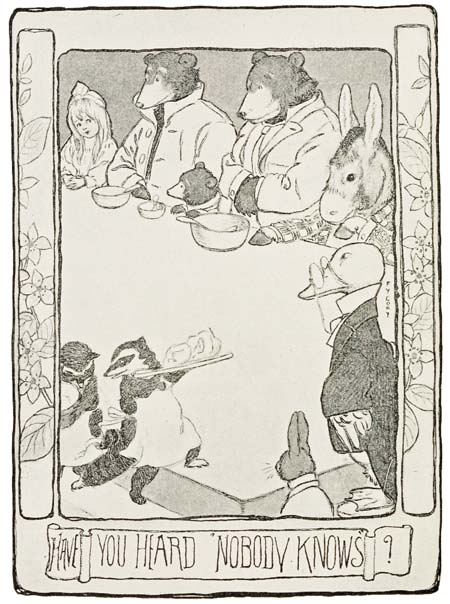
HAVE YOU HEARD “NOBODY KNOWS”?
[121]“Silence!” said the Middle Bear. “Go on, Just Buddie.”
“Well, I’ll try,” she said; and she began:
“That doesn’t sound just right,” she said, with an appealing glance at the Rabbit.
“It sounds all right to me,” said the Middle Bear. “Please continue.” So Buddie, though still doubtful, went on:
“I’m sure that isn’t right,” said Buddie. “Anyway, I know how the Chorus goes.” The Rabbit knew, too, and he joined in:
At this point a curious thing happened. The[122] Loon burst into hysterical laughter, and, springing into the air, went whizzing round the room in gradually narrowing circles, wheeling higher with each turn. Buddie followed him with her eyes.
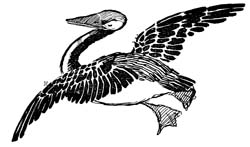
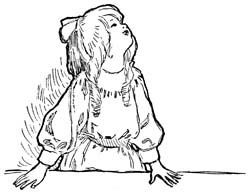
“He’ll have to stop when he gets to the ceiling,” she thought.
But the ceiling rose with the Loon, and it grew brighter and brighter, until at last the sky appeared. Up and up wheeled the Loon, until he became[123] a mere speck in the blue, and disappeared altogether. Then Buddie looked down—
But the Bear’s house, and the Bears, and the Donkey, and all the others, had vanished with the Loon, and she was again in Beavertown. Everything was as she had left it, except that the Laziest Beaver no longer fanned himself with his tail; he had fallen asleep. But the Yellow Dog, apparently as fresh as ever, was finishing the Chorus which Buddie had begun and the Loon had interrupted.
And, as before, there came the peculiar echoes around Buddie’s head; but this time she kept her eyes fixed on the Yellow Dog.
“Every time I look up,” she thought, “I am carried off to somewhere else. And I want to stay a little while and talk to Colonel.”
The experiment succeeded beautifully. The echoes floated away, but the meadow and the little river remained; the Laziest Beaver slept beside his tumble-down house, and the Yellow Dog began another verse of his seemingly endless song:
[124]
“I’ll look up just the least little bit,” said Buddie to herself, when the echoes again came flying around her head. But no sooner did she raise her eyes than, as before, the sky broke into little patches and the tree-tops ran together. She looked back quickly—but it was too late! Just a glimpse of the Laziest Beaver’s tail as the scene shifted, and she found herself, as she had expressed it, “somewhere else.”
As far as Buddie could see in either direction stretched a wide, straight road, bordered with small firs and floored with springy moss. In winter this road, which had been made by lumbermen, was smooth and level; in the spring it was all water, for it ran through a swamp; but as summer advanced it gradually dried out and made a very pleasant highway for little girls, who seldom or never came there, and for the people of the wood, who used it a great deal. Both sides of the road were white with the blossoms of Enchanter’s Nightshade; but as Buddie had seen no other flower since she entered the wood, she had grown rather tired of it, and would have welcomed a little variety.
“I wish these were violets,” she said, picking[126] another bouquet. “Violets are prettier and smell nicer. Why, they are violets!” she continued, surprised and delighted to find that not only the blossoms in her hand, but those along the road had changed into her favorite flower—blue and white and yellow.
So she rambled along, gathering violets until her two hands could hold no more. And presently she began to wish she might see some roses. Violets are pretty and sweet, but one can get too much even of violets, don’t you think, Little One? Anyhow, Buddie thought so, and she wished again, out loud (for that is the only way to wish if you expect your wish to come true), that the violets were roses. And behold, they were roses! The swamp road was gay with them.
Luckily Buddie did not suspect that these wonders proceeded from the bouquet of Enchanter’s Nightshade, now forgotten, which was fastened in her hair; for had she wished it were something else, only to throw it away after it had become a bouquet of violets and roses, her adventures would have come to a sudden end.
[127]
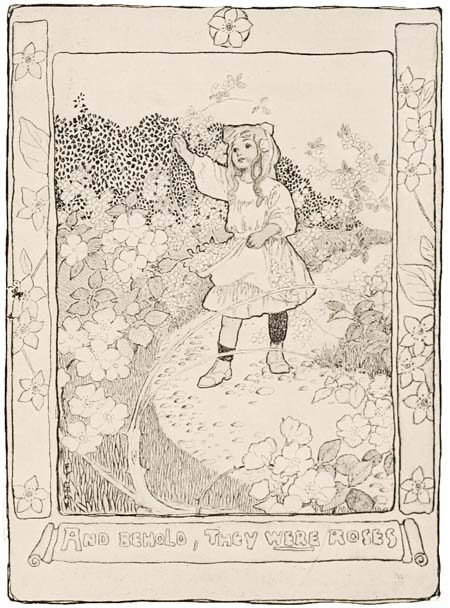
AND BEHOLD, THEY WERE ROSES
[128]She was not long exhausting the list of flowers she knew. Promptly at her wish the roses became harebells, the harebells became daisies, the daisies became marsh marigolds, and so on, until she could no longer think of a new flower to wish for. I think it was nice of her to be content with flowers, don’t you? She might have wished for candy, or oranges; or, as all the trees along the road were Christmas trees, she might have wished them decorated with toys and sweets. I am not at all sure she would have resisted the temptation if it had come to her; nor that such wishes would have come true. All I can tell you is, she was quite satisfied with the flowers, and walked for a long way before she got tired of the wishing game.
At first it was a relief to be alone in the wood—there had been so much talking and singing, and such a deal going on; but after a[129] while Buddie began to think it would be pleasant to meet some of her wood friends again. There was her engagement with the Rabbit, who was to escort her to the Greenwood Club. What if it were past two o’clock, and the Rabbit had tired of waiting for her at the Corner, wherever that might be? One can tell time, the Donkey had said, by the way it flies, as one can tell a sandpiper or a crow; but he had neglected to explain just how to do it. No doubt time was flying—it always is; but Buddie, looking up at the blue sky, could make nothing of time’s flight.
While she was puzzling over this matter, which a grown-up would have found difficult, she came to a place where the roads forked, or, rather, where two roads met; for when a road forks, the tines of the fork should be smaller than the handle; but these roads were of the same width, and as like as two peas. However, there was no doubt which she should take, for there was a sign-board that read:
[130]
 THIS WAY TO THE CORNER
THIS WAY TO THE CORNER
I don’t know who put up the sign-board, Little One. Since Buddie told me her story I have been over the swamp road, but I saw nothing of a sign-board, although everything else was as she described it, even to the very tall Christmas tree that stood just where the two roads came together.
The hand on the sign-board pointed up the right road, and Buddie was reminded of the Rabbit’s directions for putting back the Guinea-Pig’s eyes: whichever one you choose first is right. But after she had walked another long way the Corner seemed as far off as ever. As the road was perfectly straight she could see ahead for a long distance, and there was no sign of anything that looked like a corner.
“I don’t believe I should know it if I came to it,” she thought. The Rabbit had not explained what sort of corner it was.
[131]Was that something moving up the road? Yes, it was; and it was coming her way.
“Why, it’s a lamb!” she cried, when it drew nearer. “But is it a lamb? It’s black, and lambs are white.”
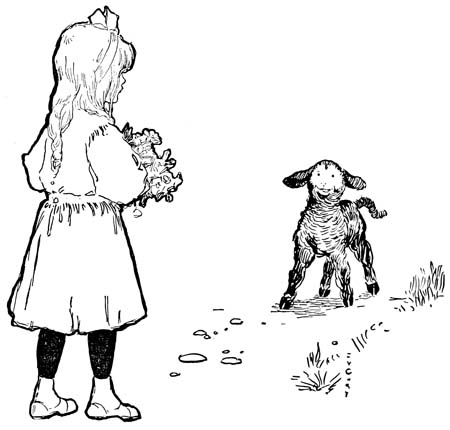
But it was a lamb, nevertheless, and a remarkably self-possessed and easy-going lamb, too; not the sort that runs about bleating, scared out of its wits.
[132]
“I’m very well, thank you,” said the Lamb, before Buddie had a chance to ask, “How do you do?”
“No; most lambs have black fleece,” continued the Lamb, anticipating another question. “I had an elder brother who was different: he was the white sheep of the family. We seldom speak of him. Yes; I know what you are thinking of; but Mary’s Little Lamb died years ago. You may recite it if you wish.”
Buddie could not help doing so; for the old jingle had come into her head and insisted on getting out again. So she began:
“That’s not the way I learned it,” the Lamb interrupted. “Try another verse.”
Buddie went on:
“That’s all I know,” said Buddie.
“Try to forget it,” advised the Lamb. “It’s all nonsense, especially that part about the school. Now, this is the way it really goes:
This was not the version Buddie had learned, though perhaps it was the way the story ought to go. It really was too much to believe that everywhere that Mary went the Lamb was sure to go.
[135]Meantime the Black Lamb had moved along, cropping the wild mint that grew along the road, as much as to say: “That will give you something to think about until you see me again.”
“Before you go,” said Buddie, “I wish you would tell me where the Corner is.”
“There’s a sign right in front of your nose,” said the Lamb, saucily. Eating mint always makes a Lamb saucy.
Sure enough; tacked on a tree was another sign-board:
 THIS WAY TO THE CORNER
THIS WAY TO THE CORNER
It was exactly like the first, except that the hand pointed down the road.
“Why, I must have passed the Corner,” said Buddie. “Could you tell me—”
But the Lamb had disappeared. Doubtless he had wandered in among the trees.
[136]
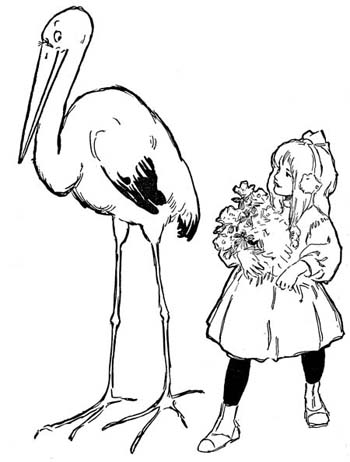
Something else was in sight, however. Away down the road was a large bird, and Buddie hastened toward it.
[137]“It’s a crane,” she said. “No; it’s a heron. No; it’s a—” What was it?
Closer inspection proved it to be neither heron nor crane, for it was white, with black-tipped wings, and it had a certain grand manner about it foreign to cranes and herons.
“Oh, I know what it is now!” cried Buddie. “It’s a stork.”
The Stork turned his head slowly as Buddie approached, and regarded her with a most amiable expression.
“It isn’t so,” he remarked, before she could frame a question. “I never carried one in my life.”
“Never carried one what?” asked Buddie.
“Baby,” said the Stork.
“You see,” said the Stork, “in the first place I couldn’t carry a baby; and in the second place, I wouldn’t if I could. I think that disposes of the matter.”
There was no reason for the show of impatience that accompanied the disclaimer, as Buddie had said nothing about storks carrying babies and hadn’t intended to say anything, for the very good reason that she had never heard they did.
“The least reflection,” went on the Stork, although the matter had been disposed of, “will convince any one of the absurdity of the idea. I don’t know exactly how many storks there are in the world—the new census isn’t out yet; but I know there are so many more[139] babies than storks that we simply couldn’t handle the business, even if we had nothing else to do; and we have other things to do, I can assure you. Besides, I couldn’t carry such heavy bundles. Besides, I hate carrying bundles—it’s so vulgar. Besides—what are you staring at? Is there anything wrong about me?”
There was something wrong about him; precisely what, Buddie was trying to make out.
“Oh, I see!” she suddenly burst out. “You’re standing on both legs.”
“So are you,” retorted the Stork; “but I don’t gawk at you as if you were a freak.”
“But I’m supposed to, and you’re not,” said Buddie.
“Well, I like that,” said the Stork, though it was easy to see he didn’t. “What are legs for—to keep off the sun, like a parasol?”
Buddie felt that she was in another losing argument, but she stood by her small guns.
“I’ve seen storks before,” said she; “not[140] real live ones, you know, but in a picture-book; and they all stood on one leg, and looked—” She paused. Just how did they look?
“Foolish?” hazarded the Stork.
“Just like four,” said Buddie.
“Indeed?” remarked the Stork. “I’ve heard about looking like sixty, but never like four. And pray, how must one get one’s self up to look like four? I am curious to know.”
“You would have to hold up one leg,” said Buddie.
“Oh, one from two leaves four, does it?” said the Stork. “That’s a new kind of arithmetic.”
I think, Little One, that Buddie’s explanation was scarcely clear enough. A stork looks like four when he is wading,—stalking his game,—at which time he lifts one foot slowly and puts it down very carefully; but when he is resting he has to look like one or eleven.
“I’m too old to begin gymnastics,” went on[141] the Stork, as Buddie remained silent. “You can’t teach an old stork new tricks. Though I dare say I could stand on one leg if I tried.”
“You wouldn’t be very smart if you couldn’t,” said Buddie, tartly. The bird had a most provoking air about him.
“Tut! tut! I’m old enough, child, to be your grandfather. We’ll see about this gymnastic business.”
So saying, the stork lifted one leg, and attempted to balance on the other; but, to Buddie’s great delight he fell ingloriously on his head, his long bill running into the soft ground like a fork into a well-done potato.
It isn’t polite to laugh at one old enough to be your grandfather; so Buddie checked her glee and ran to help the unfortunate bird to rise.
“Don’t be silly,” he said, declining assistance, and making a great clatter with his bill, as all storks do when excited or angry. “Don’t be silly. You’ll be teaching a fish to swim next.”
[142]A second and third attempt to stand on one leg met with no better success than the first, the Stork falling first one way and then another, and all the time working himself into an extremely bad temper.
“Perhaps if you leaned against a tree you could do it,” Buddie ventured to advise.
“That’s not a bad idea,” said the Stork, slightly mollified; and he proceeded to put the idea into effect, with entire success. “Now, then,” said he, “take the tree away and see if I can stand alone.”
“I can’t take the tree away,” demurred Buddie; “but you can lean against me, if you like, and when you’re ready I’ll walk off.”
“That’s another good idea,” approved the Stork. “But don’t walk far, as I might fall before you returned.”
So Buddie placed her hands against the bird’s side and steadied him while he drew up one leg; and when she thought he was properly balanced she stepped back a little. But the[143] Stork, like Jill, came tumbling after, and Buddie had to push him back. This operation was repeated a dozen times, until Buddie’s patience was exhausted and her arms were tired.
“If you began by holding up your foot just a little way,” said she, “you could put it down as quick as a wink when you felt yourself falling.”
“That’s the best idea yet,” said the bird. “We’ll rest a bit, and go at it again later.”
The Stork’s idea of resting was to plant himself firmly on both legs, with his feet wide apart and one foot a little in advance of the other. Standing thus there was no danger of falling. But Buddie’s notion of a breathing-spell was quite different. She sat down in the grass with her chin on her knees and her hands clasped around them.
“So I look like four in your picture-book?” remarked the Stork. Buddie nodded. “It’s ridiculous to put such books in the hands of children. It gives them false ideas of natural[144] history. They’re as bad as fairy tales; and I’d no more give a fairy tale to a child of mine than I’d stand on my head.”
“You came near standing on your head a little while ago,” said Buddie, mischievously. The Stork ignored the remark, and continued:
“Take the story of The Three Bears. I dare say you’ve read that.”
Buddie nodded eagerly.
“I like that story best of all,” said she.
“I suspected as much,” returned the Stork, severely. “It’s a most immoral story, much worse than the stories about cutting off giants’ heads. There is no danger of a child growing up with an ambition to cut off a giant’s head, because, in the first place, there are no more giants, and, in the second place, if there were there’d be a law against it; but there is danger in letting children believe that it isn’t wrong to steal a bear’s porridge, and break his chair, and muss up his bed, as Goldenhair did.”
“It’s not so in my story book,” Buddie protested.[145] “It was a naughty old woman who ate the bear’s porridge.”
“You must have a new version,” said the Stork. “It was time they did something about that story; it was making criminals of children every day. And how about Jack and the Beanstalk? It was a fine thing for Jack to steal the giant’s bag of gold, wasn’t it?”
“He was a wicked giant, and Jack’s mother was dreadfully poor,” said Buddie.
“Hoighty, toighty!” cried the Stork. “That’s a nice excuse, isn’t it? What do you expect will become of you, child?”
This was a hard question, which Buddie did not attempt to answer, and the Stork went on, in the same scolding tone:
“Then those ridiculous stories about dragons. Why do little boys torture cats, and little girls pull bluebottle flies to pieces?” Buddie couldn’t say. “Because they like to pretend that cats and bluebottle flies are dragons, and they’re pulling them to pieces for the good of the country.[146] Why do little girls like pretty dresses and new hair-ribbons?” Buddie had never analyzed this natural desire. “Because their heads are full of nonsense about princesses gowned in silks and satins. Why do little girls throw crackers to swans in the parks?” This was entirely beyond Buddie. “Because each one thinks she may be doing a service to some king’s son, who has been transformed by enchantment into a swan, and who will reward her by carrying her off to his father’s kingdom in a golden chariot drawn by butterflies. Such books, I say, are poison to a child’s mind; and if I had my way I’d burn every one of them.”
“You shan’t burn mine,” declared Buddie, stoutly.
“Well, go your way,” said the Stork, sadly. “I wash my feet of you. If you come to a bad end, don’t blame me.”
Buddie was not alarmed by the Stork’s gloomy forebodings, but she was the least bit disturbed by his denunciation of fairy tales and picture-books.
[147]“What kind of books should little girls have?” she asked soberly.
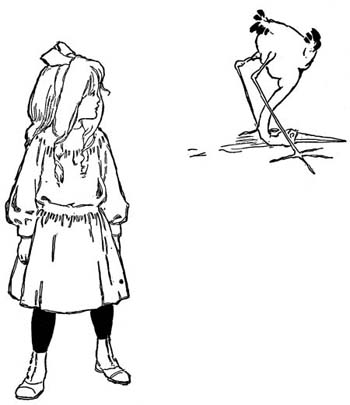
“Blank books,” was the reply. “They contain nothing one should not know, and they prove—I am speaking of blank books which are ruled—two things every one should know: that a straight line is the shortest distance between two points, and that parallel lines never meet.”
“I’d rather have my[148] own books,” decided Buddie, after a little reflection.
“Go your way,” the Stork said again; and this time Buddie acted on the hint.
“I think I shall,” she said, rising. “Good-by!”
“Good-by!” said the Stork, not unpleasantly, and resumed his gymnastics.
Buddie turned once or twice to watch him, but he did not seem to be getting on a bit well.
“I’m afraid he will never look like four,” she thought. “He’s so stupid.”
Buddie had walked a long way from the Stork before it occurred to her that she had forgotten to inquire of him the way to the Corner: it was just possible he knew. But it was too far to go back; so she kept on in the hope of coming to the Corner or some path leading to it. This hope was soon realized. A very plain opening in the wall of fir-trees disclosed itself, and another sign-board gave information that this was the way to the Corner. Strange she had not noticed it when she passed that way a little while before!
It proved a pleasant path to follow, especially after it drew away from the swamp and began to climb a little ridge. The Christmas trees gave place to birches and poplars, and[150] sweet-smelling Canada balsam, and other trees that prefer hard ground to swamp land; a white-throated sparrow, which seemed to be traveling Buddie’s way, sang every minute or two his happy little song; and a brook, which was traveling the other way, gurgled something that sounded like: “What’s the use of going uphill when it is so much pleasanter to go down?”
But Buddie had not much farther to go. There was one steep little hill to climb, and a huge fallen tree to get over, but, these passed, her journey was at an end. On a big pine-tree was a fourth sign-board which read:
THIS IS THE CORNER
“What a perfectly ’diculous corner!” cried Buddie, disappointed because, so far as she could see, it did not differ from any other part of the wood.
[151]Nothing in the wood, Little One, is harder to find than a corner. And if you don’t know one when you see it, you shall never find it. There was a sign-board to tell Buddie, but I never heard of anybody else being assisted in that way.
Little as there was to see at the Corner, Buddie had no opportunity to look about. The patter of feet sounded close at hand, and the Rabbit made his appearance. He was equipped for a journey, and evidently no short one; on his back was a large pack—that is, large for a rabbit.
“On time to a minute,” he said, referring to himself. “Have you been waiting long?”
“I just came,” answered Buddie. “Is it far to the Greenwood Club?”
“Oh, no; only a little way. We can follow this path or take a short cut through the brush, as you prefer.”
Buddie thought the path would be more agreeable, and they moved along, the Rabbit[152] chatting pleasantly about the weather, which was remarkably fine, even for that time of year, but making no reference to the birthday party at the Bear’s and the strange way it broke up.
Yes; he was going on a journey later in the day, after the frolic at the Greenwood Club. He was going up to The Well, as he had informed her when first she met him. Where was this wonderful Well? The Rabbit could not say; he had never been there. Then how did he expect to find it? He had a map, which he showed Buddie.
“My grandfather made it,” said he. “He went up to The Well five years ago.”
“To find out why a rabbit wabbles his nose?” The Rabbit nodded. “Did he find out?” The Rabbit shook his head.
“The water was too high; he couldn’t get near the mouth of The Well.”
“Why, what a funny map!” cried Buddie.
“What’s wrong with it?” demanded the Rabbit.
[153]Buddie did not undertake to say right off. She had seen a great many maps. Every land-looker that stopped at the log house for a chat or a dinner had a pocketful of them, and many an expedition into the timber had been planned within Buddie’s hearing. All these maps were ruled off into little squares, in which were indicated the rivers, swamps, hills and trails—when there were any trails, which wasn’t often. But the Rabbit’s map—well, if you will glance at the next page you will see just how it looked.
“What’s wrong with it?” the Rabbit again demanded, and in a slightly offended tone.
“It may be all right,” Buddie hastened to say; “only, you know, it’s nothing but circles.”
“When you walk in the wood where there aren’t any paths you keep going round in a circle, don’t you?” said the Rabbit.
“Do I?” said Buddie, wonderingly.
[154]
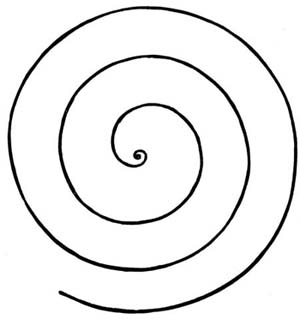
THE RABBIT’S MAP
“Of course you do,” said the Rabbit.[155] “Now, it stands to reason that if you begin by making a large circle, then a second circle smaller than the first, then a third smaller than the second, and so on, you will eventually come to what you are looking for.”
This sounded plausible.
“But,” said Buddie, “you don’t need a map for that, do you?”
“My grandfather was a great hand for maps,” replied the Rabbit. “He used to say: Never start to explore a strange country without first making a map of it.”
“It seems a dreadfully roundabout way,” objected Buddie, with another glance at the circles.
The argument was interrupted by the sound of snapping twigs, and Buddie looked up to see the long ears of the Donkey through the network of green. He, too, was on his way to the Greenwood Club, and he expressed pleasure at again meeting Buddie and the Rabbit; but, like the Rabbit, he made no reference to the Bear’s[156] party and its curious ending. Perhaps the people of the wood took such things quite as a matter of course.
“Are you estimating timber?” asked the Donkey, with a glance at the Rabbit’s pack.
“I am going up to The Well to find out why I wabble my nose,” the Rabbit replied.
“He has a map,” said Buddie, curious to know what the Donkey thought of it. “Show it to the Professor.”
The Rabbit passed it over, and the Donkey, after one look, hee-hawed outrageously.
“Thistles and cactus!” he cried. “This isn’t a map; it’s a target.”
“It’s a map, and a perfectly good one,” said the Rabbit, highly offended by the ridicule. “My grandfather made it.”
“Your grandfather must have been a Welsh rabbit, and dreamed it,” said the Donkey, with a chuckle.
“He was not a Welsh rabbit, and he did not dream it,” returned the Rabbit, now furious.
[157]“Then he must have had wheels in his head,” declared the Donkey. “Thistles and cactus! Where do you expect to get to with such a map?”
As the Rabbit was too angry to reply, Buddie repeated his explanation about traveling in gradually narrowing circles.
“Bosh!” cried the Donkey. “Why, it would take you a week.”
“I expect to be gone a week,” said the Rabbit, coldly.
“But what’s the use of spending a week on a journey you can do in an hour?” said the Donkey. “Come, be reasonable.”
“Perhaps, if you are so clever, you can show me the way,” said the Rabbit, who believed the Donkey was talking simply to hear himself talk.
“I certainly can,” replied the other, amiably. “But we’ll talk about this later. Here we are at the Club now, and it’s about time for the fun to begin.”
The grounds of the Greenwood Club were situated in and about a natural clearing on the edge of a grove of pine-trees. Here, once a week, as the Rabbit had said, the wood people gathered for a session of play and talk, their minds free from the cares of every-day life.
“We have the games and races first, and the literary exercises afterward,” the Rabbit informed Buddie. “Not many go to the lecture. Doctor Goose is rather dry.”
Now they had entered the amphitheater which formed what might be called the main club-room, and, glancing around, Buddie saw nearly all her wood friends and many she had yet to know.
“I declare, there’s Colonel!” she exclaimed.[159] “I suppose the Laziest Beaver was too lazy to come; I don’t see him anywhere. And I’m glad Colonel has finished that tiresome old song; and I hope he isn’t put out because I didn’t stay to listen to it. It wasn’t my fault.”
If the Yellow Dog was put out he exhibited no signs of annoyance. He smiled pleasantly as Buddie came up, and held out a paw in his best manner.
“Who’s your friend with the long ears?” he asked in an undertone.
“They both have long ears,” replied Buddie, looking from the Rabbit to the Donkey. “But I suppose you mean Professor Bray. He’s dreadfully wise. He’s been everywhere and knows everything and everybody.”
“Present me,” requested Colonel; and Buddie contrived to do so, after a fashion; “presenting” people was a new experience.
“What war were you in, Colonel?” asked the Donkey, affably.
“No war of any account,” replied the Yellow[160] Dog, “unless you would call a brush with Indians—”
“Sufficient to justify the title? Certainly. I served six months in South Africa and was decorated—”
Buddie did not wait to hear the repetition of the story. At the Rabbit’s suggestion she moved along and made the acquaintance of various members of the Club.
There was a Reticent Magpie, who never spoke unless he was spoken to, and whose only replies were Yes and No; a Refined Pig, who never grunted, and who would walk miles out of his way to avoid mud or bog land; an Improvident Squirrel, who never laid by nuts for a rainy or wintry day, and was continually borrowing supplies of his neighbor, a Prosperous Churchmouse, who was so fat that he could barely waddle; a Bat, who could see for miles, and who always officiated as judge in the club races; a Hen with the toothache, and a number of others of more or less account.
[161]
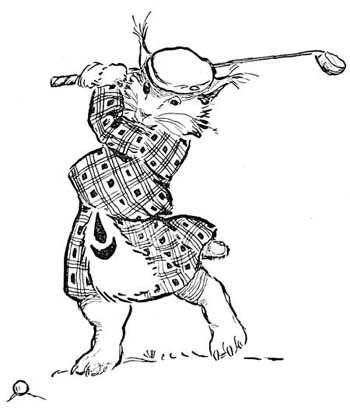
One animal in particular attracted Buddie’s attention. He wore gay plaids and a funny little cap, and he carried a stick with which he knocked a small ball from one end of the clearing to the other. First he placed the ball on a tuft of grass; then he swung the stick over his[162] shoulder and shouted “Fore!” and then he whacked at the ball, sometimes hitting it and sometimes not.
“Who is he?” Buddie asked.
“He’s the Golf Lynx,” replied the Rabbit, “and he’s a great nuisance, for he’s always hitting somebody with the ball, and it hurts, I can tell you. Doctor Goose says the poor fellow can’t help it, as—”
“Fore!” shouted a voice close at hand, and a ball whizzed by within an inch of Buddie’s ear.
“The games are beginning!” cried another voice, and everybody began to move toward one end of the clearing, where the ground pitched up and formed a sort of grandstand.
“You must excuse me for a while,” said the Rabbit to Buddie, as they fell in with the procession. “My race with the tortoise comes first.”
“Oh, do you fall asleep and wait for him to come poking along?” asked Buddie, her mind on the old fable.
[163]“No, indeed,” replied the Rabbit. “We’re pretty evenly matched. First he wins, and then I win. It’s my turn this week. On a straight line I could beat him every time; but, as I explained to you this morning, I have to do a great deal of zigzagging.”
When every one had found a seat Doctor Fox announced that the Club’s distinguished Visitor, Professor Bray, had kindly requested to act as master of ceremonies, and a great cheer went up.
The race between the Tortoise and the Rabbit was quickly run. They got away in a pretty start, and it was nip and tuck to the other end of the clearing. As it was some distance across the open, Buddie could not see who was ahead at the finish; but the Bat announced that the Rabbit had won by an ear.
“That’s the advantage of having long ears,” remarked the Yellow Dog, who sat next to Buddie.
“I don’t see how the Tortoise manages it,”[164] said she. “It’s wonderful the way he gets over the ground.”
“He’s a high-geared tortoise—the fastest one in the wood,” said the Yellow Dog. “Hello! here comes the Bear with the Weasel. Now we’ll have some fun.”
Out of the brush near the grandstand came the Great Huge Bear, rolling a furry object over and over with his paws.
“What’s the matter with the Weasel?” Buddie asked. “Can’t he walk?”
“He’s asleep,” replied Colonel. “He’s always asleep. You know the old saying: You can’t catch a weasel awake. Come along and help toss him.”
Buddie followed the others, and presently found herself holding one corner of a blanket, upon which the Weasel had been rolled. Then the jolly party began to skip around in a circle, singing—
[165]At the word “Pop!” the weasel was tossed high in the air; and as he sailed skyward he half awoke and made a sound like a cork coming out of a bottle. Before he began to descend he was sound asleep again.
Round and round they skipped and sang, until every one was tired and out of breath.
“If I could only sleep like that!” sighed the Great Huge Bear, as he rolled the Weasel back into the bushes.
The next event was an exhibition of bear-back riding by the Stork. The Great Huge Bear raced around the clearing as fast as he could go, and tried in various ways to shake the Stork off; but the bird finished the trip in triumph, and caused a great sensation by balancing, part of the time, on one leg. Buddie was especially delighted by this unexpected feat; for it was she that had suggested the idea to the Stork. Next to the pleasure of being able to do a thing oneself comes the pleasure of suggesting it to some one else that can, and thereby sharing in his success.
[166]“Playing ’Possum” was the next game on the program.
“Choose partners!” called out the Donkey, and the company, pairing off, formed a ring around the ’Possum. “Change partners!” called the Donkey, and a scramble followed. “’Possum!” was the next call, and there was another scramble, followed by a laugh at Buddie’s expense. The ’Possum had seized a partner, and Buddie was left without one. She had been forced into the ’Possum’s place in the center of the ring. It was something like “Old Dan Tucker,” with the music and dancing omitted.
[167]
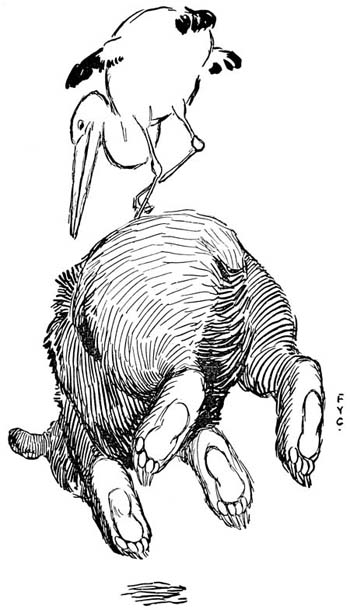
Next came a bowling contest, open to all members of the Club large enough to take part. Ten chipmunks, sitting up straight and stiff, served as pins, and the Fretless Porcupine curled himself up for the ball. In the ordinary bowling alley the ball must be rolled back in a trough; but the Porcupine simply uncurled himself after each throw, and trotted back for[168] another. He seemed to enjoy the game as much as the others, and the chipmunks didn’t mind being pins, for they were seldom knocked over, and when they were it didn’t hurt them a bit.
While these sports were going on two teams of bats were playing cricket, and the still smaller members of the Club were playing Leapfrog, Worm i’ the Bud, Who Killed Cock Robin?, Beetle, Beetle, Who’s Got the Beetle? and other games; and everybody was having such a good time that very few heard the Donkey announce that Doctor Goose’s lecture was about to begin.
“Shall you stay for the lecture?” asked the Rabbit, hurrying up to Buddie.
“I should like to hear part of it, at least,” said she. “The Donkey is going to stay; aren’t you, Professor?”
“Certainly,” replied the Donkey. “Some of us should remain. The growth of letters should be encouraged.”
[169]“I like lettuce as well as any one,” said the Rabbit; “but Doctor Goose never talks about lettuce.”
The Donkey put on his most pitying smile.
“Life is not all eating and drinking,” said he.
“Maybe not,” returned the Rabbit; “but I’d rather eat than hear one of Doctor Goose’s lectures.”
“Philistine!” muttered the Donkey.
“What’s that?” asked the Rabbit, suspiciously.
But the Donkey scorned to reply.
“Light house,” said the Great Huge Bear; after which remark he dropped off into another of his half-naps.
The audience that gathered to hear Doctor Goose was small indeed. There was Buddie, who really wished to hear the lecture; the Donkey, who would as soon hear it as not; the Rabbit, who was present under protest; Doctor Fox, wearing his most critical air, and prepared to contradict every third statement; the Bear, who would as soon be dozing there as elsewhere; the Yellow Dog, who came out of curiosity; and the Loon, who never missed a chance to shriek “Hear! hear!”
“Birds and quadrupeds,” began Doctor Goose, “my topic this week is The Evolution of—”
[171]“Fore!”
A ball driven by the Golf Lynx carried away the Doctor’s manuscript.
“I’ll put a stop to that!” cried the Rabbit, starting after the Golf Lynx. But the Lynx saw him coming and discreetly took to his heels. Meantime Buddie had recovered the scattered manuscript, and Doctor Goose proceeded, as if there had been no interruption:
“—the Man Story. It is impossible to fix the date of the first man story, because we do not know precisely at what time geese began to write.”
“Literature,” interrupted Doctor Fox, “began with the Fox family.”
“You are mistaken, my dear colleague,” returned the lecturer, warmly. “Literature began with the goose-quill.”
“I leave it,” said Doctor Fox, excitedly, “to my learned friend, Professor Bray.”
The Donkey bowed.
“I have always believed,” he said, “that[172] a donkey wrote the first book; I know he wrote the last one. I regret to say that I am unacquainted with any literature by the Fox family, with the exception of the Book of Martyrs, a most excellent work, as instructive, though not so entertaining, as the rhymes of Mother Goose. The first is the older, but the second is the more popular.”
This decision was, as usual, agreeable to both disputants, and Doctor Goose continued:
“At all events, it may safely be assumed that the earliest man stories were merely records of the chase. After a man had been pursued, captured and eaten by a bear—”
“Eh? What’s that?” asked the Great Huge Bear, unclosing his eyes. “I never did anything of the sort.”
“I was speaking of the old and savage days,” replied Doctor Goose, and the Bear dozed off again.
“After such a successful hunt, it was the custom to relate the details, with more or less exaggeration,[173] to a circle of companions; and this was the beginning of the man story. For centuries these tales of the chase held their popularity; but as reason superseded mere instinct and animals advanced in civilization, they hunted man less and studied him more. Gradually they began to believe that this strange creature, whose kind spread all over the world, possessed reasoning faculties similar to their own—he might even have a soul; and to-day it is generally admitted that the line between the lowest animals and the highest man is so fine as scarcely to be discerned.”
At this point the Rabbit returned to announce, with a little swagger, the complete discomfiture of the Golf Lynx. Buddie was not so sure of this; she could see the Lynx peeping from behind a tree at the farther end of the amphitheater; whereas, according to the Rabbit, he should be “running yet.”
“That the average animal,” resumed Doctor Goose, “is superior to the average man in[174] the common virtues of cleanliness, orderliness, straightforwardness, common sense, and capacity for sane enjoyment, goes without saying.”
“Like a hickory nut,” remarked Doctor Fox.
“Why like a hickory nut?” asked Buddie.
“That’s a hard nut to crack,” replied Doctor Fox, mysteriously.
“Hear! hear!” shrieked the Loon; and this time there was some sense in the usually meaningless remark, as Doctor Goose was waiting patiently for a chance to go on. If, Little One, instead of interrupting a speaker, people would cry “Hear! hear!” when a speaker is interrupted, much time would be saved; for then there would be no interruptions.
Buddie tried to keep interested in the lecture, but her attention wandered to the Golf Lynx, who had come out of hiding and was again knocking the ball about the green.
“I don’t suppose he can help it,” she thought; “any more than Colonel can help running after sticks and stones.”
[175]Meanwhile Doctor Goose was droning along:
“It is only in the purely intellectual field that we have come to regard man as a present equal and a possible superior.”
“I doubt that,” said Doctor Fox.
“Fore!”
This time the ball carried away the lecturer’s spectacles, and confusion reigned. The Golf Lynx took to his heels, and after him raced all of Doctor Goose’s audience except Buddie, who remained to help search for the spectacles. But hunt high, hunt low, they were nowhere to be found.
“Never mind; I can get another pair,” said Doctor Goose. “Perhaps you’d like to take the lecture home and read it.”
“Thank you,” replied Buddie, accepting the manuscript rather doubtfully. “Shan’t you want it again?”
“Oh dear, no. I have stacks and stacks of them. I write nearly all the time. But it is so hard to get people to listen.” Doctor Goose[176] sighed and looked about him pensively. The world was at play; nobody cared about lectures. “Good afternoon,” he said, and walked sadly away.
“Poor Goose!” said Buddie, sitting down under a tree to examine the manuscript.
“My, what hard words! I wonder what they mean. ‘P-s-y-c-h-o-l-o-g-y.’ That can’t be right; there ought to be a letter between the ‘p’ and the ‘s.’ ‘P-s’ doesn’t spell anything. Here’s another big word—‘I-n-t-e-l-l-e-c-t-u-a-l-i-t-y.’ That looks all right, and I suppose it means a lot.”
So she turned the pages of the manuscript, which was as easy to read as print, until she grew weary of spelling out words and wondering what they meant, and began to look about for something more interesting.
Presently she saw the Donkey, the Rabbit, and the Yellow Dog returning from the pursuit of the Golf Lynx.
“The next thing, I suppose,” she said, “is to find out why the Rabbit wabbles his nose.”
With his usual show of importance, the Donkey took entire charge of the expedition to The Well.
“To begin with,” said he, “we need a guide.”
“Oho!” cried the Rabbit. “I thought you knew the way.”
“We need a guide,” repeated the Donkey, calmly, “not to show the way;—I’ll attend to that,—but to tell stories; that’s what guides are for. Now, then, whom can we get?”
“The ’Possum tells the best stories,” said the Yellow Dog; “but he’s fat and he’s slow.”
“That doesn’t matter,” said the Donkey. “Go and hire him. And—stop a minute. Can you get this check cashed for me?”
[178]“I can try the Pine-Tree,” said Colonel. “That’s the only bank around here.”
“Pine-Tree shillings are rather heavy, but they’ll have to do,” said the Donkey. “In all exploring expeditions,” he went on, as the Yellow Dog departed on his errands, “the question of funds is of first importance. And now,”—to the Rabbit,—“in what direction is The Well?”
“I don’t know,” replied the Rabbit, a little sulkily. “According to my map—”
“Pooh!” said the Donkey. “According to your target it’s north, east, south and west. Shoot such a map! However, we’ll soon find out.” He turned to Buddie. “Will you kindly break off a branch from that witch-hazel bush? Get the straightest one, and trim off the leaves and twigs. There! Now stand it on end, and when it is perfectly balanced take your hand away.”
Buddie followed these directions, and when she removed her hand the witch-hazel stick fell—it[179] really seemed to jump—toward a big birch-tree at one end of the amphitheater.
“There’s your direction,” said the Donkey. “All you have to do now is to follow your nose.”
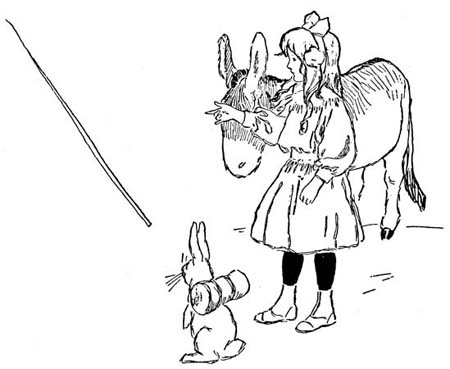
“That sounds easy,” said the Rabbit.
“It is easy—if your nose is straight,” said the Donkey. “Of course there wouldn’t be any use following such a wabbly nose as yours. I’ll go ahead.”
[180]At this point the Yellow Dog returned with the ’Possum and a bag of Pine-Tree shillings, and the expedition set forward in the following order: the Donkey, the Rabbit, Buddie, the Yellow Dog, and the ’Possum.
“I wonder what direction we really are going in,” Colonel remarked to Buddie.
“That’s easily found out,” said the Donkey, whose long ears had caught the remark, “if Just Buddie will wet her finger and hold it up in the air.”
Buddie did so.
“One side’s colder than the other, isn’t it?” asked the Donkey.
“It doesn’t seem so,” answered Buddie.
“Oh, it must be. Try again.”
So Buddie again wet her forefinger and held it up, and a little puff of wind came along and cooled the farther side of it.
“Oh, yes,” said she; “it’s the side toward you.”
“Then we’re traveling north, just as I[181] thought,” said the Donkey. “You will also observe that the farther we go the flatter the ground becomes. The earth, you know, flattens at the poles—not all at once, but gradually.”
“Isn’t he dreadfully wise!” Buddie whispered to Colonel.
“He’s a wonder,” replied the Yellow Dog, who hadn’t a bit of envy in his make-up, and always gave credit where credit was due.
For some time the little party wound through the wood in silence, the Donkey following his nose, the others following him. Presently the leader called a halt to wait for the guide, who was some distance in the rear.
“Time for a story,” he announced, when the ’Possum at last came lumbering along, puffing at every step.
“What shall it be?” asked the guide, when he could get breath enough to speak.
“A fairy story,” ventured Buddie.
“I don’t know any fairy stories,” said the ’Possum.
[182]“A good ghost story would suit me,” said the Donkey.
“I never tell ghost stories by daylight,” said the ’Possum.
“Oh, well, give us anything, only be quick about it,” said the Rabbit, who was impatient for the journey’s end.
“Last summer,” began the guide, “I was fishing for trout in the headwaters of Flute River.”
A long pause.
“Well?” said the Yellow Dog.
“It weighed six pounds,” finished the guide.
“That’s the way to tell a story,” said the Donkey, rising. “Skip the details and get at the important facts. Forward! March!”
They resumed their journey, and before long the sound of falling waters came to their ears.
“We’re getting there,” remarked the Donkey, complacently. “This beats traveling on the rings of a target.”
To this fling the Rabbit made no reply. Probably[183] he did not hear it. His thoughts were of his precious nose. At last, fortune favoring, he was to unravel the great mystery of his existence. Now or never should he find out why he wabbled his nose. Trembling with excitement, he bounded ahead, and when the others came up to The Well, they found him leaning over the curb staring into the dark interior.
The Well was picturesquely located on a sloping ledge which formed one bank of the river, at the foot of a tinkling cascade. Swirling stones in floodtime had made it—had bored down through the solid rock as neatly as a diamond drill could do the work. I have seen a great many of these wells, but none exactly like the one Buddie described to me; for this had a curb around it, and above it, supported by two posts, was the legend:
As round as an apple, as deep as a cup,
And all the king’s horses can’t pull it up.
[184]“Well, here we are,” said the Donkey to the Rabbit. “Go ahead and find out why you wabble your nose. I confess I am rather curious to know.”
“Perhaps,” said the Rabbit, nervously, “we’d better ask about the Guinea-Pig first. He isn’t here, but some one can inquire for him.”
“What does the Guinea-Pig want to know?” asked the Donkey, who never had met that tearful little creature.
“He wants to know why his eyes fall out when you hold him up by the tail,” the Rabbit replied.
“For that matter,” said Colonel, “I should like to know why a yellow dog isn’t considered as respectable as a dog of any other color.”
“And I,” said the ’Possum, “should like to know why I dislike the taste of persimmons and can’t eat ’em.”
“And I,” said the Donkey, “should like to find out the best singing method. How about Just Buddie?”
[185]“Nothing—that is, nothing I think of just now,” she replied hastily.
“Well, suppose you ask for the rest of us,” said the Donkey. “All in favor of Just Buddie’s asking all the questions will say ‘Aye’; contrary-minded, ‘No.’ The ayes appear to have it. Motion carried unanimously.”
“Which shall I ask first?” said Buddie, as she knelt at the curb and the others gathered about her.
“Oh, ask about the Rabbit,” said the Donkey. “Let’s get that off our minds. Lean over as far as you can, and holler at the top of your voice. It may be a long way to the bottom.”
Clutching the curb tightly with both hands, Buddie bent over as far as she dared. As she did so something passed before her eyes.
It was the long-forgotten bouquet of Enchanter’s Nightshade, which had worked loose from her hair-ribbon, and now vanished in the depths of The Well.
“Why does a rabbit wabble his nose?”
Not even Echo replied.
Buddie waited a little while, her ears strained for the slightest whisper in response; but, none coming, she shouted the question a second time.
Still no answer.
“I’m afraid Truth isn’t at home to-day,” said Buddie, getting up from her knees. “Why, where have they gone?”
Not a soul was in sight. She was again alone in the wood.
“I’m sure I didn’t look up this time,” she said, perplexed and grieved by the disappearance of her friends. “And—what’s become of The Well?”
[187]The curb, the posts and the legend they supported had also vanished. All that remained was the cylinder-bore in the solid rock.
For the first time that day Buddie began to feel frightened. The cascade no longer tinkled; it thundered. The wild river, stained with the juices of burnt land and swamp land, its dark breast flecked with the foam of countless falls and rapids, rushed by within a foot or two of where she stood, and the ledge trembled under the mighty blows of the plunging torrent. White arms seemed to reach up from the pool to draw her into the black water, and the flying spray wet her face. Terrified, she ran back among the trees, threw herself on the mossy floor of the wood, and hid her face in her arms.
Thus she had lain for some minutes, a dreadful fear tightening around her little heart, when suddenly a familiar sound brought her scrambling to her feet. It was Colonel’s bark; but it seemed a long way off, across the river. As it was not instantly repeated she began to fear she[188] had heard it only in imagination; but presently the cheerful voice of the faithful Yellow Dog sounded again above the roar of the falls, and Buddie ran down to the river, calling “Colonel! Colonel!”
An especially happy yelp answered her, and the Yellow Dog burst through the brush on the river’s farther bank. But instead of crossing on the boulders, which were conveniently disposed for a bridge, he ran back into the wood. He was out again in a moment, wagging his tail and barking joyously, as much as to say: “Here she is! Could any black or brown dog have done better?”
Back he flung into the brush, and when next he appeared a man came with him. Buddie recognized Mr. Goodell, a land-looker who frequently stopped at the log house by the lake.
“Hello; Buddie!” called the land-looker, in his big good-natured voice. “Don’t stand so near the water, little girl, or you’ll tumble in. Good dog!”—patting Colonel, who was now[189] frantic with delight and cleared the stream in two bounds.
Mr. Goodell made the passage more carefully. A slip meant a ducking, if nothing worse.
“So you paddled into the woods and got lost, eh?” remarked the land-looker, unswinging his pack from his back and proceeding to fill his pipe. “Seem’s if I’ve heard your ma say something about that sort o’ thing.”
“But the bears didn’t eat me up,” said Buddie, recalling her mother’s familiar warning.
“Well, I guess there ain’t many bear about here,” said the land-looker with a smile.
“I saw three,” said Buddie, eagerly: “the Great Hooge Bear, the Middle Bear, and the Little Small Wee Bear.”
“So!” said Mr. Goodell, seriously.
“And a Beaver, and a Rabbit, and a Guinea-Pig, and a Loon, and a Fox, and a Goose, and a Donkey—” Buddie went on, rapidly enumerating her acquaintances of the day.
[190]The lighted match fell from the land-looker’s hand.
“A donkey!” he repeated. Then he smiled, and struck another match, and for a few moments smoked in silence.
“And we had such a good time at the Greenwood Club,” said Buddie. “The Rabbit and the Tortoise ran a race, and we tossed the Weasel in a blanket, and Doctor Goose read a paper and—oh, dear! I can’t begin to think of all the things we did. And, oh yes, we came up to The Well to find out why the Rabbit wabbles his nose. Didn’t we, Colonel?”
The Yellow Dog barked.
“I guess, little girl, you fell asleep and dreamed all this,” remarked the land-looker, eying her curiously.
“No; I didn’t,” declared Buddie, positively. “It was really.”
“Well, tell me all about it,” said Mr. Goodell, with another indulgent smile. And Buddie, beginning at the beginning, which is always the[191] best place to begin, gave him a faithful account of the day’s doings.
The land-looker listened gravely, and when the story was done he rose and swung his pack upon his back.
“I guess there’s room for you to ride,” said he, hoisting Buddie to his shoulder. “We must get home before your folks begin to worry.”
So they set off for home, the Yellow Dog trotting contentedly behind.
“You must sing your song for Mr. Goodell, Colonel!” Buddie called back to him.
But the Yellow Dog only barked. And from that day to this Buddie has never been able to get a word out of him concerning their remarkable adventures.
[192]
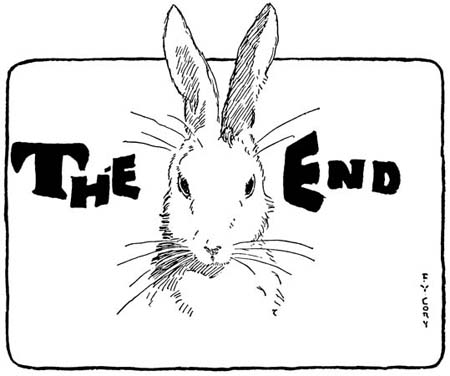
THE END
TRANSCRIBER’S NOTES:
Obvious typographical errors have been corrected.
Inconsistencies in hyphenation have been standardized.
Archaic or variant spelling has been retained.
The music files are the music transcriber's interpretation of the printed notation and are placed in the public domain.
Music file links will not work in mobile e-book formats like epub or Kindle/mobi. Readers can listen to the music or download music files in the HTML version.
New original cover art included with this eBook is granted to the public domain.